#too explicitly queer and full of questionable characters and themes
Explore tagged Tumblr posts
Text
The Supernatural fandom would love a live action All For the Game adaptation. It'd be a hot mess, but they'd love it. Two sets of codependent brothers, homoerotic staring, ace spectrum gay yearning, a group of abused underdogs taking on the Goliath (family trauma).
#it'd never happen#too explicitly queer and full of questionable characters and themes#but i think the supernatural fandom would vibe with aftg despite it being in a different genre altogether#spn#aftg#i've made a similar post before but i do think aftg has a lot of things tumblr longs for:#imperfect complicated queer disasters with a boatload of issues who take on their trauma head on and win#and a central queer slow burn romance with a whole lot of subtext that can't be baited because it's a done deal
3 notes
·
View notes
Note
"He needed an internet connection so he could download an app to draw with, but the whole point of setting the thing up in London was because he knew Crowley understood all of this a whole lot better than he did."
Okayyyyy I just got violent flashbacks to the s2 finale this is evil 😭😭
But in all seriousness, I LOVED the new bnf au chapter, I mean the kiss??? I audibly gasped, it was soooo good
I was wondering if the witch and the witchfinder are a canon couple in the nice and accurate prophecies? Or are they just a very popular fanon ship? Or is it like good omens, where people saw the romantic subtext in the book and where it was made explicitly canon in the show?
I just think all options would be really interesting, given that Crowley and Aziraphale are both middle-aged queer people and the book came out thirty years ago. So they either would have had some representation back then, or they recognised themselves in the story and even though it wasn't canon, maybe those ideas would later explicitly be confirmed by Agnes Nutter nonetheless? Since all these options have really interesting implications for the way they both interacted with the source material, I'm really curious what your thoughts on the matter are.
Thank you so much for all the beautiful things you create for the fandom, both your fics and your art give me life and I'm so grateful for them ❤
omg you have no idea how excited i am about this question 😭 as i've written BNF, i've been quietly fleshing out more about their fictional fandom, and accidentally gotten reeeeally invested and am dying to talk about it 😭😭
i'm actually tempted to make some fanart of the witch & the witchfinder, using michael and david as facecasts to go full meta thphptftf. in b4 i write it as a fuckin book series for real
buttttt i'll put all my N&A thoughts under a cut so i dont ramble too long on your dashes 💛
The Nice and Accurate Prophecy: Agnes Nutter's book series (turned play, turned film, turned tv series); the fandom in my fic Big Name Feelings
the idea of using Agnes Nutter's "Nice and Accurate" book for the in-fic fandom was taken from @tawnyontumblr's fic New Messages (i just thought that would be a fun fanon consistency to follow), but all the details about the story and characters are me.
N&A takes inspiration from Good Omens (as a story, and as a fandom) but isn't intended to be a direct copy of it. the original paperback series is a few books long, and each adaptation of the books are considered good, accurate, canonical content. the tv show (a HBO series) is the most recent, highest quality, and most popular. The Witcher style, high fantasy quality.
agnes is loudly supportive of the lgbt community just like neil/david/michael are. but i imagine that for the series to be so "marketable" over the last 30 years, there isn't an explicit queer relationship between the witch & finder. there are canon queer side characters but the witch & finder are a little more nuanced.
the witch and the witchfinder aid each other through time, working together to defeat the evils in the story (like Aziraphale and Crowley from GO). there's tension between them, but boundless love, and plenty of flirtation, despite the running "we shouldn't, we're meant to be enemies" theme. they would canonically get together at some point in the story, probably towards the end after they've spent some time dancing around each other.
the thing that makes this vague is: the witch reincarnates through the story, almost doctor who style. they're a trans icon, much like how the GO fandom looks at Crowley and all his gender ambiguity.
when they finally tryst with the witchfinder, they're female. it's by pure happenstance that they're female presenting at that stage of the story, but still widely critiqued over the years. the thing that canonises the mlm relationship is that the witch is said to carry their consciousness through each reincarnation— they're not a new person like The Doctor is when he regenerates.
the start of the book series spends more time on "Crowley and Aziraphale's favourite male reincarnation", while the movie and tv show only briefly montages through some of the witch's faces. the mlm side of the fandom most definitely lost their minds over the brief few minutes of screentime that they got of the male witch, and has absolutely gifsetted it to death.
i've done it like this because so much of (every) fandom has always been seeking out representation and filling gaps where the original content lacks. there's something to be said about the solidarity of queer fans creating more queer content for themselves. except, in the case of N&A, they're getting to work from a source material that is genuinely queer supportive, unlike fandoms like SPN and BBC Sherlock that are fighting against the tide of queerbaiting and buried gays.
it also gives aziraphale and crowley a chance to band together in the next chapter when they talk to a dickhead at the party:
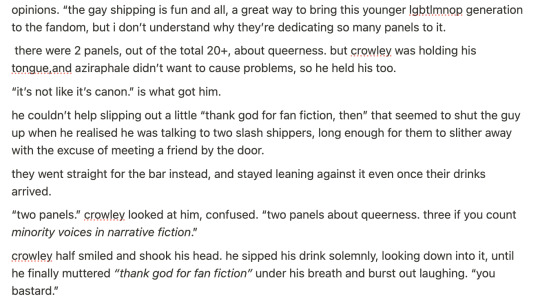
i haven't exactly decided what happens with the witchfinder, like if the story takes place over hundreds of years and he keeps reincarnating as the same lookin dude (like how jack whitehall plays both Thou Shall Not Commit Adultery and Newton Pulsifer) or if it's set over one lifetime and the witch just gets killed and regenerates a lot. i do like the idea of there being some "through the ages" shenanigans, and a canonical "modern day" setting like GO has.
but i gotta be careful bc i genuinely can't stop thinking about this fake story that's barely mentioned in my fan fic or i'll end up writing the damn thing myself
91 notes
·
View notes
Note
Rec list for Eddie and Symby being vaguely to very gay?
I'm sorry for coming to you with my monsterfucker agenda 😔👊 (no I'm not)
i mean, i probably could’ve seen this coming.
venom is dominated by two opposing narratives. let’s call this the “relationship narrative” and the “control narrative”. they’re not perfectly separated, like, you’ll definitely get elements of one in the other, but generally one of them describes what the story, at its core, is using the symbiote for.
now comics are an endless tug-of-war at the best of times, much less the gayest and slimiest of times. there’s a neverending backlash and backbacklash going on between these two takes. what you want is the relationship narrative.
everything very much started out with that take. eddie and the symbiote are two characters who forge an evil alliance because it lets them do what they wanna do (kill spider-man, more or less) and they have the same kinds of neuroses and complexes and syndromes. lots of early comics are also very fun about the merged consciousness, merged identity deal. that’s kind of the textbook relationship stuff.
personally i absolutely think the original stories (venom was created by david michelinie) have romantic undertones, even starting in the villainy days. eddie describes their first meeting as “a shadow moved, caressed me.” he takes the rejection of the symbiote still being “in love with” spider-man really hard. he sobs his eyes out when he thinks it’s dead and promises to avenge it bare-handed. they totally expect to live happily ever after on a deserted island together.
then there’s venom: lethal protector, which is cute on its own, but if you’re reading for slime romance, i very specifically recommend the novelisation. i won’t even spoil it. and then, planet of the symbiotes is the first comic that i would say has outright queer themes, intentional or not.

so all those recs until now are collected in this post.
we're trucking along through the 90s, we explore elements of one take and then the other and sometimes we ignore the symbiote completely, but not too much changes, overall. the next BIG stop in Gay Venom is, of course, the hunger.
miniseries by len kaminski, just venom: the hunger. plenty of people have written their essays on it, but what’s always important to me is that it DID NOT come out of nowhere. as said above, it expanded on themes that were there, it references michelinie venom very explicitly, like you get your SECOND “tenderly touching the green glass tube” scene.
but yes this one is specifically about, like, stigmatisation, otherness, mental illness, meeting all those things with care and empathy and optimism, tentacle sex. again, many essays. a venom comic that can go “look at the twisted deviance of this relationship” and then turn it around into “but how are you looking at it” is good. god how good would it be if they also did that to eddie more. anyway.
a few years later you get the first MAJOR fucking backlash, culminating in the SECOND story titled the hunger. spectacular spider-man: the hunger, from 2003. completely reboots venom and retcons their motivations and backstories, makes very spiteful references to planet of the symbiotes and the hunger, like it is not also called that by sheer coincidence. literally starts out, in a comic that wants to tackle and redefine venom, with the line “the PROBLEM is that you guys are like an old married couple”. so the new status quo is that the symbiote only ever used eddie to be with spider-man, and eddie only ever used the symbiote to not die of cancer.
the “control narrative” that really kicks in here uses the symbiote as, you know, a thing to control, eddie’s demons personified or even a completely foreign force to torment him. if eddie is evil, it’s not because of what he thinks and believes and wants, it’s because he couldn’t control the symbiote and gave in to its inexplicable bloodlust.
this is an unambiguous downgrade in terms of complexity, in my humble opinion, completely fucks up eddie’s responsibility themes, and is also a pretty clearly petty reaction to venom’s absolute oversaturation in the nineties. the bitch was everywhere and most of it wasn’t good. so there was LOTS of “look at this creepy loser” content by writers cringing themselves into self-awareness at the time. the 00s were going to be GRITTY and MATURE.
this of course means that we get to see eddie slit his wrists and bleed to death on panel after selling the symbiote to supervillains as an attempted act of redemption???
wild fucking times! it’s not exactly worth recommending as ~shippy~, but the first real backbacklash to this first round of retcons comes from dan slott, who just kind of ignores it all in new ways to die. drags eddie back to the land of the living and relevant, makes the symbiote refuse to let its new host kill him, telling that host, and reestablishing, that it loves eddie. and then, to keep him living and relevant, slott makes eddie anti-venom.
don’t even worry about it. anti-venom is essentially eddie seeking redemption with symbiote powers, but without the symbiote, except he pretty much acts no fucking different at all, just keeps on being a murderous vigilante with cracked ideas about innocence and guilt. people still act like he’s better now because, in its metatextual ways, the hunger was right.
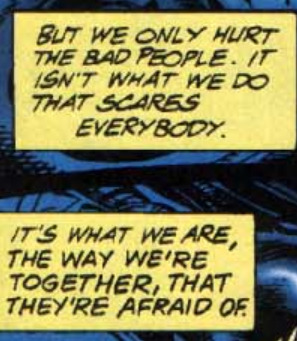
then fucking uuuuuuhhhhhhh. agent venom. symbiote goes to flash thompson and the us military, and the writer, rick remender, goes really, really, really hard on the control narrative. the symbiote becomes a substance flash is addicted to, gives a voice to his past abuse, it’s dark times all the times.
people very much do like that narrative for flash, like at least from that perspective it was worth it. i don’t like it much for the symbiote. for the symbiote, representing everything fucked up with flash and forcing him to murder kill bite all the time is resolved via the good guy avengers literally lobotomising it so flash can wear it without further resistance or input. imagine doing that to a human person. you’re uncooperative so we’re gonna turn off your higher cognitive functions and wear you like a meat suit. happy ending for everybody! truly we’ve conquered our demons this day.
then! at the same time, there’s a cartoon coming out, it’s called ultimate spider-man. THAT one does the control narrative take with harry osborn, but then does the relationship take with flash, making it the only cartoon to outright redeem the symbiote and let it find friendship and be valued as a person.
and people loved it! so brian michael bendis gets it in his head that he’s going to redeem the symbiote and make it partner up with flash. and he does redeem it by the highly fucking questionable means of having it be “cleansed”, aka brainwashed and relieved of its memories and personality. not that it matters for long. nothing fucking matters in comics. take this with you if it’s the only thing.
so then for fun friendship times you get venom: space knight, flash and the symbiote’s adventures in space! and then that gets cancelled. eddie is off somewhere being toxin and hunting carnage (2016). many good comics but you did not ask for them.
and THEN.
it is time for the next MOTHER of backlashes.
flash gets literally discarded at fucking roadside to put the symbiote back on eddie and turn back time on their relationship to RIGHT before the FIRST backlash happened. you know, all those 2003 retcons. gone. ignored. no more. venom’s themes are now those circa 1996 again. full fucking on relationship narrative. ROMANTIC relationship narrative, and that after the symbiote was turned into eddie’s evil shadow, after he hated it and spent a LONG time seeking to eradicate all symbiotes (and not even for the first time).
the COSTA run. venom (2016). reviled and beloved.
like this comic is fucking ANGRY about symbiote treatment. i HAD to tell you all of that so you’d understand ANYTHING it’s doing. the first thing it does is flip it completely around, puts the symbiote on a military guy who’s making IT do bad things, makes his ability to control it horrifying and abusive instead of heroic and admirable. one of the later things it does (in the follow-up venom: first host) is outright feature a villain who lobotomises symbiotes, ending on a symbiote serving him swift and sweet payback by doing the same thing TO HIM. it’s exactly as unsubtle as the hunger (2003) was about its hang-ups.
comics... are a conversation.
flash remains a symbiote friend but still got fucked over big time by it all, symbiote-focused writers slott and costa also kind of use him to literally, in case anybody hadn’t caught on, literally spell out the REAL story that’s been going on in the writer's room for the past THIRTY YEARS:
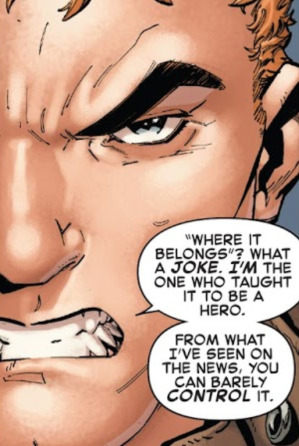
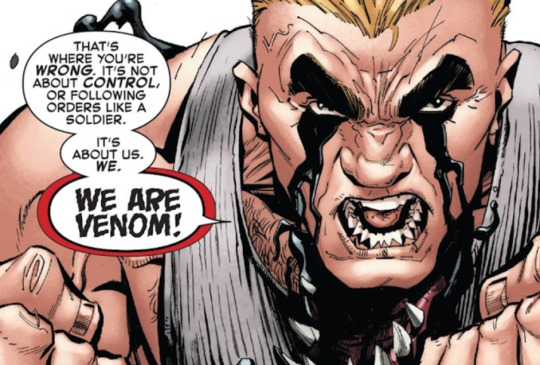
you’ll notice i didn’t actually list any of the Gay Shit for you, you’ve probably already seen it or you’ll get to see it for yourself. yes, they are deeply in love, yes, it’s fucked up and flawed, yes, it is real and taken seriously and has ultimately redeeming potential. yes the concept of that nearly knocked me off my feet and in front of the subway at one point. yes there’s mpreg
it’s also fucking riddled with events, which spin off into other comics, so either ignore those and rely on the recaps OR click yourself forward through the “next issue (story)” button on marvel wikia to know what to read.
and after that must of course come the backbackbacklash, as certain as death or taxes. in the next run, we retcon everything once more, eddie just needs to control his darkness, the symbiote was an evil abuser all along, nothing on earth is ever new.
i’m not gonna go through it, i’m just gonna point you to the backbackbackbacklash issue that came out during this time: venom annual volume 2 number 1 - it’s confusingly named, it’s the one that has a blue-skinned space lady on it. this one ignores the backbackbacklash going on very pointedly and goes “it’s not ABOUT control” again, it’s pretty explicitly romantic.
and then there’s also marvel comics presents (2019) #5, which, oddly enough, does not particularly feature the characterisation you’d typically see in the relationship narrative? but it does feature eddie and the symbiote literally fucking, so you’d want to know about it.
that’s the overall, like, frame of eddie and the symbiote being in a relationship (nuh uh) (yeah they are) (NUH UH) (YEAH THEY ARE)
some stuff that’s smaller but still notable, uh.
nova (1999) 6 - 7, that’s the “we’re space married”
venom: dark origin, that’s an ALTERNATE (!!!) take on the character, don’t expect a likeable eddie but it’s very darkly funny and gay so what can i say.
venom: the end, which i would absolutely fucking hate to be canon, i think its characterisation is quite regressive, but the symbiote sure is in love, i guess.
venom: separation anxiety, the dawn of the control narrative but eddie’s characterisation did not have to go so wrong from here, like if they’d just figured out AT THIS STAGE that he's STILL acting like venom without it... i digress. it has the symbiote going eddie eddie eddieee
venom: sinner takes all, this is the first she-venom comic so that’s. hm. interesting. healing symbiote blanket
don’t read venom: license to kill just look at this panel with me
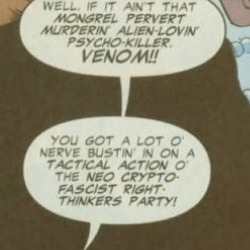
if i think of more comics worth adding i’ll add them.
the subtext slash text is heavy enough to be present to some degree in literally every cartoon adaptation of eddie brock. spider-man: the animated series goes FULL control narrative, in fact it started the “the symbiote corrupted peter” take that we to this day cannot escape, but the first few venom episodes are VERY playful about their relationship.
in spectacular spider-man it’s canon, but horrible. eddie’s in love with it, but eddie's a good boy and the symbiote is played very, very, very abusively. i think this is an evil symbiote adaptation that works well enough, at least it’s an actual meaningful character instead of just a malevolent force to resist.
in marvel’s spider-man, the only venom episode worth watching is venom returns.
i’ve actually got every symbiote-relevant episode listed right here from when we did our communal watch-through.
also watch truth in journalism. idk if it’s exactly shippy just do it
199 notes
·
View notes
Text
Hey guys, I’ve decided to stop publishing Saltcoats for a number of reasons. I'm aware that many of you are going to initially be let down or confused, but hopefully once you’ve read through this post you’ll understand why this had to stop. I’ll try to hit all my points, but of course if you have any questions pls feel free to dm me or reply to this post.
DISCLAIMER: Ending this fic was a decision I came to by myself! No one asked me to do this, though many did help, and if you have something to add please do not bring other tumblr or ao3 users into the conversation unless they’ve explicitly said they’re ok with that. It’s a draining and heavy topic (not to me, but for those affected) and I don’t want to cause anymore unneeded distress.
Also, I’m the only author, all the problems with this story were created by me, and were biases I should have recognized and acted on much sooner. I’m very thankful to all the people that have reached out to me about the negative impacts on this fic, but it really does come down to: I wrote and published a story that was fundamentally ignorant of its setting and racist. So now I have to do my part to apologize and educate myself/take accountability.
First off, this was a flawed concept to begin with because I was trying to do a low fantasy setting with aliens in period clothes and a work of historical fiction at the same time, and those are not things you can go halfway on.
Historical fiction that centers around people of color has a long history of simply going race-blind and faking diversity by giving poc the roles of white people in Eurocentric stories and erasing their identities. (This article about Bridgerton explains the problem better than I could.) And it was something I tried to avoid by still having the Fetts written as immigrants from Aotearoa (NZ), but completely missed the execution on because I didn’t commit to full historical accuracy in all characters and aspects of the story. Meaning, I might as well have gone race-blind because you can’t pick and choose what to include, it’s just as racist.
This creates situations like the Fetts being immigrants facing real life oppression while the Organas, also people of color, are unaffected by the social climate and living as members of the British upper class. That’s not accurate to any version of history and ends up wiping clean any point I was trying to make about race and oppression. That also extends beyond the Fetts, I was not addressing how the american characters come from a country that still allows for the ownership of slaves, the British oppression of Scottish people and their culture, or even an in-depth look at real Queer communities of that era. (and more)
Given the real life historical climate in the 1850s, a multi-racial story like this one is not successful, and is racist in its ignorance of the struggles of poc, immigrants, and the intersectionality that had with class and crime.
In addition, the Fetts being written as criminals, even if it is framed as a morally correct choice*, is still playing into negative racial stereotypes that shouldn’t have been ignored.
* I should add, I don’t mean to make it sound like i’m creating excuses for myself when I give explanations for some of these choices such as “but it was framed as morally correct”, that doesn’t lessen the damage being done, it’s still racist, I guess I'm just trying to show why so many of these things went overlooked for as long as they did, and how easy it is for white/privileged people to find mental loopholes around racism when you’re not being sufficiently critical of yourself.
On another note, the Fetts being indigenous immigrants to Britain in the 1800s is not something I should have tried to tackle in fanfiction - a medium that often lacks nuance and can easily end up romanticizing or glossing over most heavy topics. This goes for period typical homophobia, addiction, and class struggles as well.
That being said! I’m not implying that any of those things should be completely ignored in fanfiction. Addiction, for example, is something very close to me that I do still want to explore in fanfic for the purposes of education and normalization, I’m not telling anyone what not to write, just checking myself. Because in a story like this where literally everything is so heavily dramatized and also applied to characters of color by me, a white person? It’s only going to end up being out of place, lacking in historical accuracy, and wholly disrespectful.
Another major problem I wanted to address is the relationship between a rich white person and a poverty stricken poc. That's a bad stereotype to begin with, but then I tried and failed to frame Obi-Wan as ignorant and biased to a point where his social status plays into the theme of class critique. But, if he’s still being written as Cody’s love interest, all his negative characteristics are ultimately going to be ignored and excused by the narrative (by me).
I’m not trying to end this conversation, I’ll always be willing to talk about this to anyone who’d want to say/hear more, but I don’t want run the point into the ground with over-explanation.
So, in conclusion, this fic had to stop and be broken down into the problem that it was. All white authors who write for the clones need to be hyper-vigilant about the fact that we are creating narratives for poc, and that our inherent racism is always in threat of being baked into in the stories we publish and spread to an audience. I was in the wrong when I wrote this story, and it should never have gone on for this long. I apologize for both my actions, and to anyone I may have hurt along the way.
This is getting posted on ao3 in the fic, and then, for now anyway, the fic is going to be deleted after a week. I’ll leave this post up and answer everyone unless it's someone trying to change my mind. Also, if I ignore an ask please send it again, tumblr might just have deleted it. I don’t want to try and bury this or run from my mistakes, I just don’t think that leaving the fic up where it can still find an audience will do anyone any good. Thank you for reading
If you're interested here's some resources I've been using to educate myself further:
What caused the New Zealand Wars? - An excerpt of the book by Vincent O'Malley of the same title. It gives a good summary of the violent colonization and oppression of Māori people and their culture by the British empire.
NZ Wars: Stories of Waitara (video) - Very educational documentary about the NZ wars and British colonialism. There are some historical recreations that get violent so pls watch with caution.
Historical American Fiction without the Racism - Tumblr post by @/writingwithcolor that talks specifically about Black people in the 1920's, but makes a good point about race and historical fiction in general. I'd recommend any post from this blog, especially their navigation page just a lot of great resources
Who Gave You the Right to Tell That Story? - An article about writing outside of your race that includes a diverse series of testimonials
History of Scottish Independence - Details the colonization of Scotland by the British empire, sort of long, can cntrl + f to "The Acts of Union" for a more direct explanation.
The best books on Racism and How to Write History - A list of well written and diverse works of historical fiction and why they are good examples of representation
I have a lot more that I can share if you're interested (x x x x) but this post is getting a bit too long.
#I proofread this a lot but I'm sure there's problems with this post too#If anyone has something they want me to change or of theres anything I said that was offensive I'd appreciaite any help fixing it#but also I'll be rereading this all night and it will likely change before I put it on ao3#saltcoats#racism
54 notes
·
View notes
Text
Lengthy analysis of Holes, as promised!. This will include spoilers, which will be marked. Just gonna go through the book and the philosophy/themes/connections I caught onto this time around. Stuff discussed, in order: connections to Camus, on the question of children’s books, systems, cycles, and why Stanley is gay and jewish 😏
Camus:
The first and perhaps most obvious set of texts/theories it makes sense to put Holes in conversation with is the works of Albert Camus. Holes starts out with a description of the sun and the heat, which readers of the Stranger will remember are major themes there. The heat continues to be a prominent part of the story, though thematically, it functions very differently in the two books. In The Stranger it primarily represents the indifference of the universe (or at least so claim a ton of sources and I’m inclined to agree) and the lack of control we exert over our own lives while in Holes it’s basically the opposite of that. The heat and drought is implied to be a semi-divine punishment for a past injustice and, moreover, the elite adults of the camp have air conditioning and access to shade: the sun does not affect everyone equally in Holes as it does in The Stranger (though even that is debatable: I don’t think this was Camus’s intent, but it’s notable that it’s only the white englishman who’s driven to murder by the sun. This could certainly be read as critique of colonizers who cannot/refuse to coexist with the land and environment and how the indigenous population always suffers for it, but I digress). The other Camusian parallel one is immediately inclined to draw is that, of course, of Sysiphus: there’s the repetitive and seemingly meaningless act of digging holes not to mention that carrying stuff up a mountain is both thematically and plot-wise a very important part of Holes. But, once again, it is eventually revealed that both acts do carry an inherent meaning. Holes does not present the image of an uncaring universe: on the contrary, destiny and semi-divine influence plays a major role. The story may start out with a series of seemingly random and inherently meaningless events, but as the story progresses, people, actions, items, and events become increasingly imbued with meaning. In the Holes universe, one must imagine Sisyphus redeemed, not through the act of rolling the stone but by rebelling against it. I have difficulty imagining that Sachar was not thinking of Camus while writing Holes, or, at the very least, that if he encountered Camus afterwards, he must have been struck by the similarities. I don’t know if there was a specific intent in creating a story so embroiled in Camusian absurdism, especially since the target readership is (allegedly) children who almost certainly are not recognizing specific allusions to Camus, so perhaps the similarities are purely aesthetic — after all, everything that is nominally similar does play quite different thematic roles. However, I would never pass up the opportunity to talk about the myth of sisyphus and I think placing Holes in dialogue with Camus can raise some interesting questions about the nature of meaning.
Is Holes a children’s book?
Speaking, though, of the target audience, the audience for this book is in fact children. What about it makes it a children’s book makes it difficult to say: the protagonists are children (and, I would argue, it is not a coming of age story, despite the claims of one piece of lit crit about Holes in which i disagreed with almost every claim made, but i digress once more) and the writing style is fairly simple: you can read it with a second-grader’s vocabulary. Also, of course, being a children’s book doesn’t (and crucially shouldn’t!) mean that it’s lacking in depth and complexity. However, I think most thematically rich children’s books tend to be quite allegorical. The Little Prince is a good example. Holes is just way too specific for its sole market to be children. It’s either intended to be read by multiple generations at once or for child readers to return to it as an adult. It addresses themes of racism (and not just generic racism, anti-black racism in the reconstruction south), homelessness, intergenerational trauma. and the modern carceral system. These are social critiques that will probably go over most kids’ heads (certainly over mine). However, the themes of the text are not inaccessible for children. You don’t have to understand the particular history of the US criminal justice system or even that Sachar is making a comparison to anything specific to get that the system that he’s portraying is unjust. Knowing the real-world context just adds another layer to the text. Holes also has one of the hallmarks of children’s books that I really like, which is a particular type of absurdism that the child characters come up against. This always rang true to me as a kid and well into my teens, when you start understanding that your life is controlled by some set of systems, but you haven’t quite gotten what those systems are or why and how they came about. Like nowadays, I can say “we did this in elementary school because of a state law, that because of a federal law, that because of the history of puritanism, and this because we got a grant for it”, but as a kid nobody tells you these things or really even cares to explain why the rules are as they are, and the systems that govern your world, often with no small degree of violence and almost always with an inherent disregard for your agency, are ineffable and slippery, and good children’s books capture this really well (Series of Unfortunate Events is probably my favorite example of this, where a secret organization that everything is implicated in and more more tragicomic details about it get revealed until the Baudelaire children find themselves to some degree members with mixed feelings is honestly an excellent coming-of-age allegory. oh, not to mention the constant conflict with bureacracy. god that series is so good, everyone read it). Back to Holes, Sachar weaves the more fantastical ineffable elements in with real-world issues so neatly. Stanley’s family is allegedly cursed, which is why Stanley keeps having bad luck, but he also lives in systemic poverty, which is also why he keeps having bad luck. Sachar eschews neither the allegorical elements common in children’s literature nor the more direct systemic critiques more often found in YA and adult lit, and it creates a really unique vibe. I think the story really benefited from having a children’s author, and I would love to see more authors in both children’s and adult lit do this!
Systems
Speaking of the systems, this book is surprisingly radical. Like it’s full-on an abolitionist text. The law is pretty much only ever presented as adversarial, both in the story of Stanley’s present time, and in Kate and Sam’s story. It’s implied if not stated repeatedly that Stanley and the other boys are pretty much victims of circumstance and have been imprisoned pretty much for the crime of being poor. The hole-digging is shown to be cruel and bad for the boys. It’s noted that in digging the holes Stanley’s heart hardened along with his muscles. This is of course very evocative of the system of retributive justice we have in America. Additionally, Camp Greenlake’s existence can ultimately be traced back to an act of racist violence, also in close parallel with our prison system. Hole’s stance on justice is very restorative. Punishments are never shown to work: only through righting the wrongs can true justice be achieved. Moreover, Holes even gives the opportunity for redemption to a minor antagonist when [minor spoiler] Derrick Dunne, the kid who was bullying Stanley in the beginning ultimately plays a small role in helping Stanley regain his freedom [spoiler over].
Cycles
Cycles are a major theme in holes, and Sachar creates a unique temporality to support this theme. There are 3 interwoven stories: that of Stanley’s in the present date, that of Stanley’s ancestors, and that of the land that Stanley is on (though, as I will delve into later, it’s at least a little implied that Stanley is descended from the characters in that story also). The stories from the past reach in and touch the present. You can’t untangle the past from the future. Looking at this again through a social justice lens, it could be seen as fairly progressive commentary on what to do with regards to America’s past wrongs. The past cannot and will not be left in the past: it must be dealt with on an ongoing basis. Even the warden, the greatest villain of Stanley’s story has a sympathetic moment at the end where it’s revealed that she, too, is stuck in a cycle of intergenerational trauma she can’t break free from.
Stanley is gay and jewish
Ok, I will now talk about how Stanley is a queer Jew, but this entire section will be riddled with spoilers, so read the book first and then come back!
A queer Jew?? i hear you ask. You’re just projecting. Yes, 100%. However, I think that interpreting Stanley as both these things adds to the thematic richness of the text. Let’s start with the Jewish bit: it’s not explicitly stated that Stanley is Jewish, but his great-great grandfather is a nerd-boy Latvian immigrant with the last name Yelnats, and his great-grandfather was a stockbrocker, so, like, ya know. Louis Sachar is also himself Jewish, as was the director of the movie, who cast Jews in the roles of Stanley and his family (dyk Shia LaBeouf is Jewish?? i did not), so I know I’m not the only one interpreting it this way. And honestly, does it not resemble the book of exodus quite a bit? They escape what is pretty much a form of slavery and wander in the desert. Sploosh resembles the well of Miriam, and then they ascend up a mountain to the “thumb of god”, perhaps in a parallel to Moses receiving the commandments. Is this a useful way to look at the text? Who knows. But what I think we do get from reading Stanley as Jewish is a more nuanced discussion of privilege and solidarity. If Stanley and his ancestors are Jewish (or at least Jew-ish), then what placed the curse upon his family (and, we see, Madame Zeroni’s family isn’t doing so great either) is the breaking of solidarity between oppressed people. But also, the fact that you are also marginalized does not wash you of the responsibility to other marginalized groups. I don’t think Sachar intended it this way, because I think he probably would have talked about it more if he had, but I would say this book can be read as a call to the American Jewish community to take an active role in forging solidarity with other marginalized groups and actively righting the wrong you, your ancestors, and your community wrought upon them.
Now, why do I think Stanley and Zero are gay? Before I go into how it augments the text thematically, I bring to your attention this passage.
Two nights later, Stanley lay awake staring up at the star-filled sky. He was too happy to fall asleep.
He knew he had no reason to be happy. He had heard or read somewhere that right before a person freezes to death, he suddenly feels nice and warm. He wondered if perhaps he was experiencing something like that.
It occurred to him that he couldn't remember the last time he felt happiness. It wasn't just being sent to Camp Green Lake that had made his life miserable. Before that he'd been unhappy at school, where he had no friends, and bullies like Derrick Dunne picked on him. No one liked him, and the truth was, he didn't especially like himself.
He liked himself now.
He wondered if he was delirious. He looked over at Zero sleeping near him. Zero's face was lit in the starlight, and there was a flower petal in front of his nose that moved back and forth as he breathed. It reminded Stanley of something out of a cartoon. Zero breathed in, and the petal was drawn up, almost touching his nose. Zero breathed out, and the petal moved toward his chin. It stayed on Zero's face for an amazingly long time before fluttering off to the side.
Stanley considered placing it back in front of Zero's nose, but it wouldn't be the same.
Girl, I’m sorry, that’s gay as shit! It’s such tremendous tenderness, not to mention the traditionally romantic imagery of moonlight and the flower petal. There’s also the non-romantic aspects. Stanley’s inexplicable happiness and suddenly liking himself evokes, for me, at least, the experience of coming out to yourself, of realizing who you are. Later in this chapter, Stanley contemplates running away with Zero despite the fact that it would make them lifelong outlaws. This book, remember, was written in 1998, and homosexuality was decriminalized in 2003, and the book takes place in Texas. It would have been, if anything, even more evocative of gayness when it was published. Now as to how this increases the thematic richness of the text: obviously, in carrying Hector up to the thumb, giving him water, and singing the lullaby, he redeems the wrong done by his ancestor, after which his family’s luck immediately changed. However, after Hector and Zero return to camp Greenlake, rain falls there for the first time. What was redeemed here? Remember that earlier on we learn that what caused the drought was the fact that Sam the onion man (who was black) was murdered for kissing Kate Barlow (who was white) — so what would a [post-factum wronging of that right look like? Zero, as we remember, is black while Stanley is white, so them being in a romantic relationship would be a successful interracial relationship to redeem the one Kate and Sam weren’t able to have. It’s also, as I said earlier, implied that Stanley is descended from Kate Barlow on his mother’s side: Stanley remembers seeing the other half of the lipstick tube with her initials on it in his mother’s bedroom. I’d also argue that Sam the Onion Man is implied to be descended from Madame Zeroni (chronology-wise, I think he’d be her grandson). First of all, there’s no follow-up with Madame Zeroni’s son who moved to America, and pretty much all other plot threads are followed up with in Holes. Secondly, Sam mentions water running uphill, just like Madame Zeroni does. Even without these speculations being true, Stanley and Hector being gay would redeem the land they’re on, but If they are, the parallel with the other ancestral redemption arc becomes to much to imagine it was unintentional.
So anyway, those are my thoughts on Holes, now everyone go read it!
#was trying to express my dad that shia labeouf is jewish but couldn't remember how to pronounce his name#so i was like. dyk sheeya labeeoof is jewish? indiana jone's son. shaya labyof. Pap. Indiana Jone's son. you know who he is. Pap come on#when he figured out who he was he asked if harrison ford was also jewish#as a joke#and turns out he fucking is! his maternal grandparents are jews from minsk!#quoth my father: 'they're everywhere. nothing is sacred'#lololol#anyway this fucking booooook you guys
15 notes
·
View notes
Photo





AND SO WE END.
The implication of this scene (especially with all the zooming out iinto earth and space it does I skipped over)- is that thanks to the girls’ buried memories of their time travel adventures, they aren’t going to drift apart in the same way they did in the old timeline. At least not right now. Tiffany’s mantra carried through. They’ll remain friends and be together longer. What they went through, their journeys, did have an impact and a new future has been born. Maybe someday they’ll remember everything, maybe they won’t, but that much is true.
Mac’s last lines (along with probably being flirting with Kaje) also have a clear ending- the girls can only move forward now, they can’t go back.
It’s a bit of an ambiguous ending that leaves a lot of things unresolved. Part of me would have liked more of a definitive bit about the girls reclaiming the knowledge that was forcibly taken from them- it does feel like some of the themes, like the whole “tree of knowledge and you know what Eve was right to taste it etc etc” could have been carried through more strongly. It also, again, seems like the “truce” the adults decided on is super unsustainable and that could have been interesting to explore. And it definitely irks me a bit that every single queer character in this comic (except Kaje) either dies or are sentenced to die young (and Kaje will likely end up mourning her childhood gf despite explicitly wanting to fight fate). There’s some wiggle room that maybe things could go differently for Mac in this timeline (though no logical reason why they would), but still, not my favorite!
Then again, with all the stuff this comic set up, an ambiguous ending is probably the most fitting and maybe the only way to go. “Growing up” and “finding your future” are always ongoing, always evolving, always ambiguous, and always full of questions without answers. So it does work for the story in a way.
Paper Girls has been a long ride and an interesting read. Sometimes it felt like it was doing too much at once and became hard to juggle (for my tiny brain, at least), but it was always creative and always compelling and always rich. I’m so glad I got to read this story with all of you. The long ride is over, but as we bike off into the sunrise, I hope we can carry it with us and stay together a little while longer too.
15 notes
·
View notes
Text
RWBY Recaps: Volume 8 “Strings”
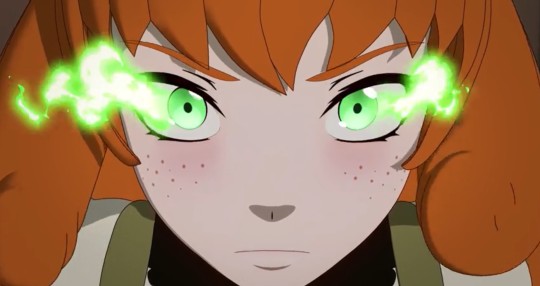
Happy Saturday, RWBY friends! I am, quite obviously, going to dive into the recap in just a moment, but first I wanted to take a short detour to discuss the elephant in the tumblr room. Namely, Supernatural.
For those of you out of the loop, the tl;dr is that a fifteen year, beloved show ended with a truly horrendous finale. Specifically, the finale rejected everything that the show had been building towards: the logical conclusion to character arcs, the theme that “family don’t end in blood,” the potential for a queer romantic relationship… I could go on. The point I want to make is that the fandom had every reason to believe we’d be getting these things. This isn’t a case of fans upset that the finale didn’t go the way they wanted as an individual viewer, but rather that the finale didn’t go the way the show clearly and explicitly said it would. It’s not an exaggeration to say that in many respects, viewers were straight up lied to.
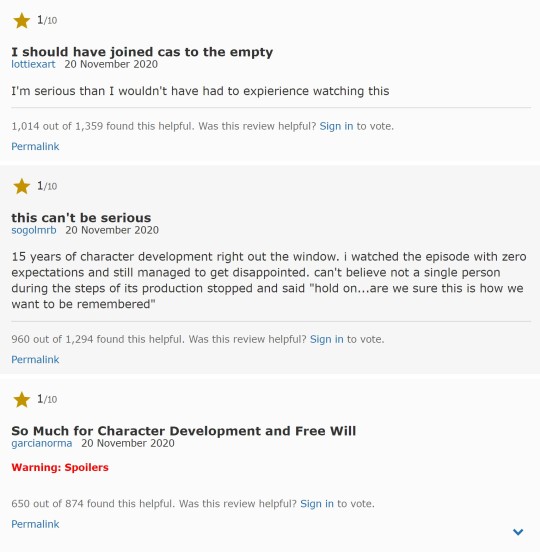
(I recommend reading the reviews.)
What does this all have to do with RWBY? Well, I can’t help but think that history is repeating itself. Certainly there are some notable similarities between the two series. Both have long, meandering plotlines with no clear end in sight (though I hope RWBY doesn’t reach the 15 Volume mark…). Both began with a small, core cast, but quickly expanded—generating the expectation that these now equally important characters will be given their due. Both have moved from the small conflict of fighting everyday monsters to a god-based mythology. Both have a popular queer relationship dangled in front of the viewers, featuring scenes where they’re “obviously” in love… but will it ever be confirmed? Both have a fanbase that says loudly and confidently that the writers know what they’re doing. Just wait! It’s all been planned! We’ll be rewarded for our patience and soon all the naysayers will be proven wrong.
Thing is, the Supernatural fandom wasn’t rewarded. Right up until a week ago those fans—myself included—had faith that the writers knew what they were doing because they can’t really be that out of touch with their own story...right? It’s not possible. Yet they were, it was, and now that I’ve gotten solid proof of precisely how far a show can go to reject its own logic, themes, and premise, that just makes me more wary of RWBY’s mistakes. Before I had a solid faith that things couldn’t possibly get that bad, that no matter how much RWBY might be messing up in the short term, it will undoubtedly pull it together overall, because what show wouldn’t? Especially a show with such promise and, at times, wonderful storytelling. Well, Supernatural didn’t manage it and frankly I’m not sure what to do with that information.
Seriously. I don’t have any grand conclusion here. It’s not my intention to suggest that anyone should stop watching RWBY, or to claim that it will absolutely fail because Supernatural did. Obviously, we don’t know what will happen until we get to see it in the show. I only want to acknowledge these parallels and the similar journey I see both fanbases on. I can’t help but wonder if, a couple years from now, RWBY fans will be making incredibly optimistic posts about how it’s all coming together, just have some faith, everyone who says that the group won’t get a satisfying ending, or Blake and Yang won’t be confirmed are just mean trolls… only to wake up that Saturday morning and get another metaphorical slap in the face.
It’s something to think about.
But here I’ve spent a page talking about the wrong show. Let’s get into the episode!
We open on a black screen with lots of ambiguous noises. At first I thought this was Oscar struggling in the Hound’s grip or something, but then I remembered that RWBY likes to insert an episode between cliffhangers. I watched Ironwood (presumably) shoot a guy and he only came back this week (though that question still isn’t answered. At this point I kind of wonder if it will be). Oscar was kidnapped last week, which means we won’t get to see him until next week. Or… two weeks from now? RT skips the week of Thanksgiving, don’t they? Sounds familiar doesn’t it? Something horrible happens to Oscar and we need to wait two weeks to find out how it’s resolved.
Watch him escape the Hound off screen and return to the group with a new outfit 😂
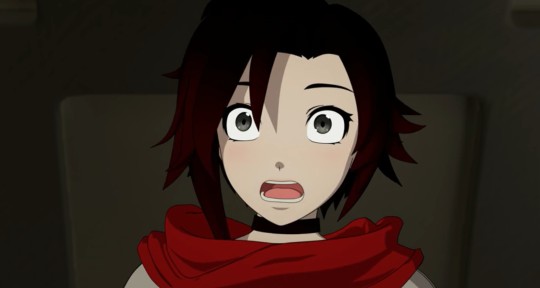
So it’s not Oscar we hear, but Ruby, the last one coming out of the tube. Weiss is in the process of pulling Nora’s ear for that stunt… with a frankly strange looking hand. What’s up with RWBY animating weird hands lately? I’m pretty sure that’s not how anatomy works.
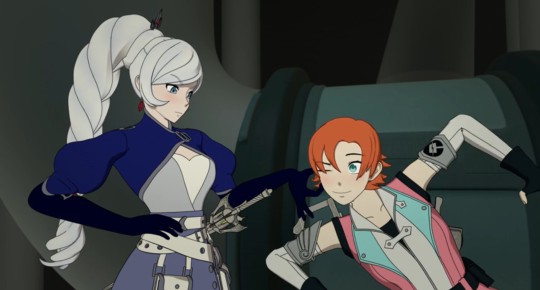
Anyway, Nora counters that this was a “Once in a lifetime experience,” but they were all going to go through the tubes regardless. Weiss isn’t pissed that you sent her through, she’s pissed that you did it unexpectedly when she was alone, heading into enemy territory. But of course, there’s no one in the room to hinder them, so the mistake is meaningless.
We’re setting the tone again though. For the first half of this episode everything is sunshine and giddy adventure, which doesn’t fit the situation at all. It also creates emotional whiplash when I’m suddenly supposed to be super worried about things later on. This sort of about-face works once in a blue moon, as an emotional punch, like we see in Mulan:
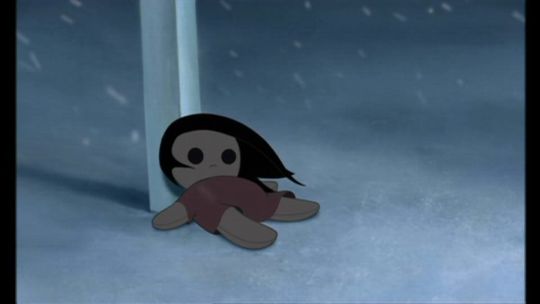
But RWBY does it every other episode, which makes the overall tone of the series confusing instead. Half the time RWBY feels like two different stories—the cartoony tale of girls going on fun adventures, and the traumatic tale of a fantasy war—that have been badly spliced together.
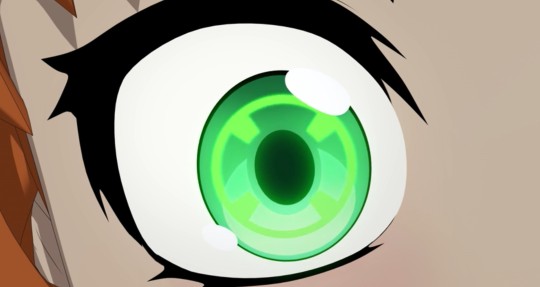
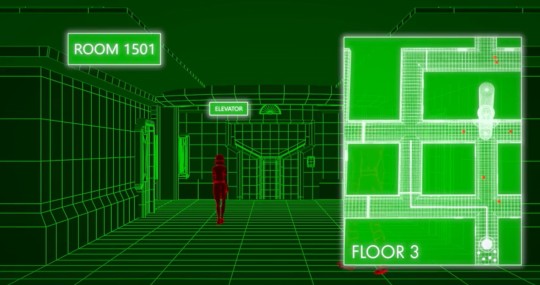
“Alight, Robo-Girl, which way?” May asks and Penny demonstrates why she’s the best for sneaking into a facility. She’s able to map out the whole place, including seeing where everyone is so they can avoid detection. Kudos to RT for going this route. I was worried that they would have Ruby and the others straight up attacking Atlas grunts, knocking them out/potentially even killing them because who cares, right? They’re the bad guys! So I’m glad they’re working to get in and out undetected. Granted, we see in some places that they’re clearly willing to fight the soldiers if it comes to that—they’re reaching for their weapons when Penny opens the final door, expecting the room to be full of people. They were going to attack—but at least they’re trying to lessen that conflict as much as possible. That’s the sort of choice I expect to see from heroes and I’m glad we got it here.
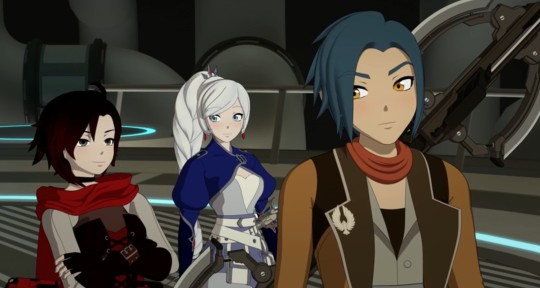
After scouting the area Penny corrects May: “And my name is Penny,” to which Ruby gives a satisfied “Heh.” I’ve got no problem with Penny rejecting nicknames, even potentially well-meaning ones, because she’s always struggled with her status as a real girl and her name is her own. She gets to decide what others call her. I do, however, have a problem with making the presumed trans character the one who is corrected. Granted yes, we haven’t gotten confirmation in the show that May is trans, but RT doesn’t get to cash in on that rep without likewise suffering the consequences for how the character is treated. You’re telling me that a trans woman is going to roll her eyes when someone asks her to use a specific name? Please give May flaws, yes, she’s a person, but out of all the millions of flaws across the human spectrum, this is the one we’re shown?
Not to mention Ruby’s continued attitude. It’s like, ‘Yeah, May. Stop being a horrible person who draws attention to the fact that Penny is a robot. I never did that.’ Except when Ruby first met her she didn’t know Penny was a robot. Just like she didn’t know Blake was a faunus—something we’re reminded of this episode. We might assume Ruby wouldn’t have ever made any missteps at the beginning of these relationships, but the fact remains that she got to know both girls before their minority status was ever revealed. Ruby loved them before she ever had to grapple with their differences.
Put in her place, May then demonstrates that she can make lots of people invisible, not just herself. That’s handy. She creates an invisibility bubble that reminds me of Harry’s invisibility cloak. In the sense that others might not be able to see you, but they can still hear and touch you, which makes sneaking around still pretty challenging.
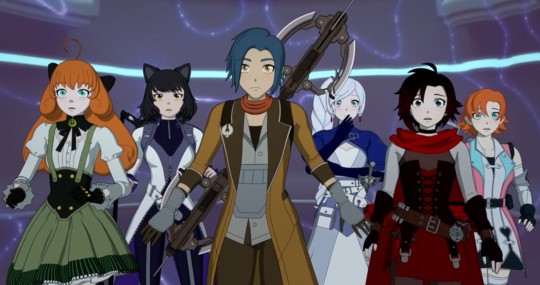
No sooner have I thought that then two guards get into the elevator with them. The group keeps quiet as the duo discusses how no one can get close to Salem’s storm without “getting shocked right out of the air.” Interesting. And frankly one hell of a roadblock if the Hound escapes into the clouds. Oscar may be gone for a while if he doesn’t escape on his own... The woman also comments about how creepy it is that all the grimm are just hanging out, waiting. It’s “worse than if they’d attacked.”
No it’s not! RT, stop trying to implement the idea that Salem withholding her forces is some epically cool choice. She should have decimated everyone by now and the fact that she hasn’t just shows how transparent the problem is: you’ve created a villain that’s too powerful and now you don’t know what to do with her.
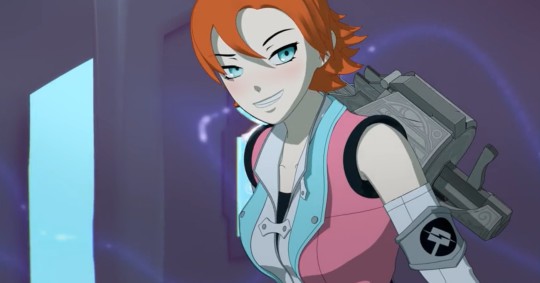
As the group sneaks out of the elevator Nora grins and presses all the buttons, which is, as expected, a dumb move. They’re supposed to be sneaking into this base. If they’re caught they’re going to be thrown in jail at best, killed at worst, but Nora wants to risk that for a practical joke? Again and again we see this insistence on incorporating comedy where it’s not only unnecessary, but actively interferes with other aspects of the scene.
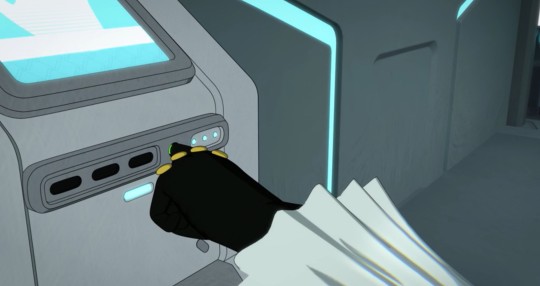
Reaching a terminal, Penny inserts her finger and gains access via Pietro’s credentials. She’s really demonstrating this episode why she’s… pretty terrifying? I mean, Penny is an incredibly powerful fighter with a computer’s view of the world, access to everything in the most powerful Kingdom alongside its information, and she now has Maiden powers to boot. Which, I should add, it took her one fight to master (because remember, the heroes are now always as strong as they need to be to win…). Now that Watts is planning to hack her, I expect her to be an incredibly formidable enemy, just given the amount she could potentially do. I think Penny herself is too kind to exploit all that potential and as we’ll see via Pietro briefly taking control, she doesn’t always have the knowledge to use the tools at her disposal. But in the hands of someone like Watts? He’ll turn Penny into the ultimate weapon.
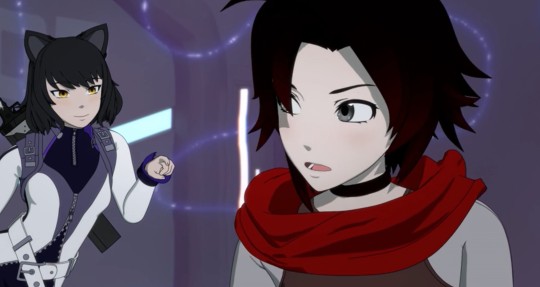
Access granted, they learn that they have to go “Right through central command!” Of course, Penny makes it sound like a fun game and the spy-movie music/cartoon lecture doesn’t help. Again, tone. It’s adorable! It just doesn’t fit sneaking into a military base with your lives on the line while Salem waits outside. That was a RWBY Chibi moment.
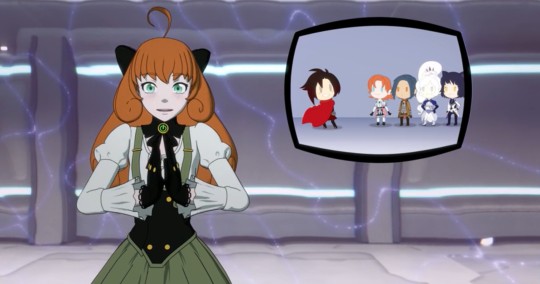
Penny explains—twice—that Ruby can use her semblance to fly them all through central command and it’s treated like a revelation. At first, I was pretty confused because Ruby has been dong this for ages? She carried Weiss in “Argus Limited” and Nora during the Geist fight. But upon close inspection, what Penny seems to have “figured out” is that Ruby can carry multiple people at once because the “mass doesn’t matter.” Okay. Not a contradiction then, though I think RT could have made it a little more clear that Ruby was shocked at the idea of carrying multiple people, not carrying someone at all.
What I do take issue with though is Ruby mastering this skill instantaneously. I mean, why is Ruby being forced to try this on the fly (pun not intended)—Penny has known the layout of the building since they made this plan. She knew they had to get past central control and that it would be packed with people. She’s obviously thought about Ruby’s semblance a great deal—and why is she succeeding? Give me a Volume 7 where Ruby actually trains in this technique, set up via Harriet’s comment early on about her semblance, and then she’s victorious here when it finally matters. Or give me Ruby assuming she can pull off this incredibly difficult skill only to fall out of her semblance halfway through, a roomful of Atlas personnel staring at them. Then what?
Not this.
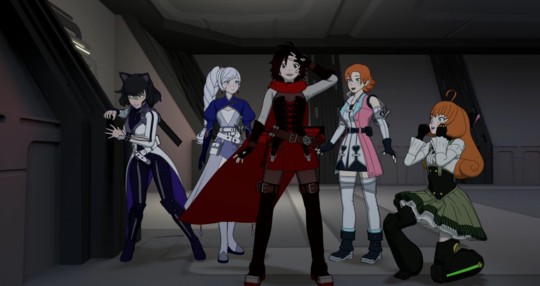
This is a character who does everything perfectly on the first try without ever having to fail. Ruby is boring like this.
Crisis averted, we transfer to Ironwood who is… working with Watts.
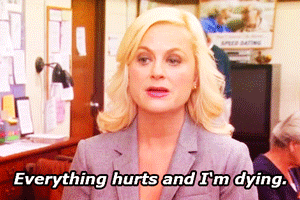
What else is there to say? I’ve already laid out all the reasons why this is stupid and makes no sense. Others keep coming onto my posts to explain to me how Ironwood’s awful deeds up until now fully show his decent into villainy, conveniently ignoring the numerous limitations he was under and his choice to do what he thought was best for the world using inaccurate information. Ironwood was always a divisive character and many are happy to ignore the years’ worth of deconstruction done—a man who looks like the Evil Military General but actually isn’t—because they never liked him to begin with. Not liking him is fine, no one has to like any character, but I’m honestly shocked by the number of viewers who refuse to acknowledge how bad the writing is, even if it means defending a character they hate a teensy tiny bit (#SupernaturalVibes). As a friend put it, Ironwood now feels like a caricature of his former self, a Pure Evil Ironwood who appeared out of nowhere and is now here to stay. He shoots kids. He shoots unarmed civilians. He teams up with Salem’s men and tries to hack Penny. These are undeniably horrible acts, they’ve just been given to a character who never would have done them until RT randomly flipped the Evil switch.
The “RWBY” tag, alongside all the fluff moments of this episode, is now filled with posts encouraging Marrow to turn, yelling at the Ace Ops for being “bootlickers,” and capslock screaming at anyone who dared to speak up for Ironwood. It still sucks to have bad writing twisted into an attack on the fans and it’s going to continue to suck until at least the rest of Volume 8. I’d like to again remind everyone that Qrow teamed up with Tyrian a few episodes, yet because he’s again in Ruby’s graces, that was twisted into a ‘not that bad’ situation. The issue isn’t really that Ironwood is teaming up with one of Salem’s subordinates, but that he’s doing it to go against RWBYJNOR… the second a character teams up with Salem to get what Ruby wants (to not have her team in jail) then that’s totally fine… but that’s a wrinkle a lot of people are happy to ignore.
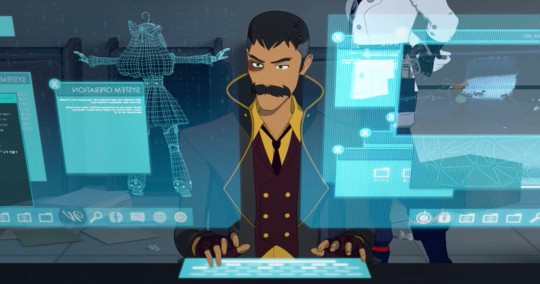
So yeah, Ironwood is an idiot now too. Like Qrow also was last Volume. He really thinks Watts isn’t going to betray him somehow? Although, I do wonder if the chance to ruin Pietro’s creation outweighs his loyalty to Salem, but the point is that Ironwood can’t be sure of that either. At least he’s smart enough to keep Watts under continuous guard. He puts his hand on Watts’ shoulders and goes, “I’d hate for us to have to try motivating you. Again.”
So he tortures people too now? Like I said, caricature. This was Ironwood and we were given no clear idea of where he disappeared to.

RIP a great character.
Watts notices though that Pietro has apparently accessed a secure area and alerts Ironwood to it. I laugh that the information is just ¡EMERGENCY! In large, red letters. Ironwood immediately makes an announcement for everyone to be on guard. It’s a level 3 lockdown — that won’t impede the group leaving via airship! — and they’re to use “lethal force” if necessary. Weiss is disgusted.
As much as I disagree with making Ironwood into a shoot first, ask questions later kind of guy — he’s definitely wrong to be doing this — I also find myself rolling my eyes at reactions like that. Yes, Weiss. You attacked four operatives until they were knocked unconscious. Prevented an entire city from escaping Salem’s wrath, endangering them all. Now you’re breaking into the most classified room in the Kingdom to steal an equally qualified project and use it for your own means. There’s no reason why Ironwood would level his might against you. Is death still an extreme response? Yes. Should Weiss be acting like Ironwood is crazy for responding to them in an extreme manner? No. Her remark makes it sound like Ironwood is attacking her poor, innocent, defenseless team… not the team that’s been lying to him, betraying him, attacking him, and stealing from him. Not the team carrying deadly weapons into a facility to take what they want at any cost.
With their presence known, May wants to go grab an airship. That’s the series now.

Meanwhile, Penny insists that they can still complete their mission and we see Nora come up with some sort of plan.
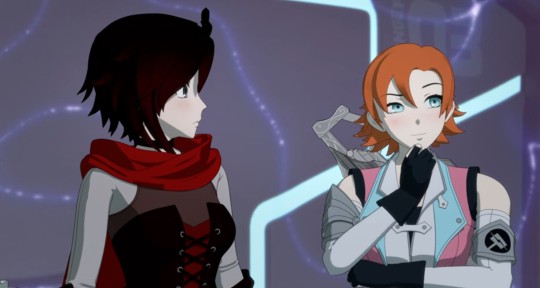
Except, what plan was this?? What did she say to the group? ‘Hey, let’s wait around until some guy conveniently walks by with a full cup of coffee. Then we can trip him and the mug will fly alllll the way across this gap to land on a terminal, startling at least two workers. Except this guy will be hated by the whole room because he’s always messing things up—his coffee mug has been changed from #1 Dad to #1 Dud—so that this little mishap will create a ruckus that gets everyone involved, giving us the opportunity to slip by them all.’
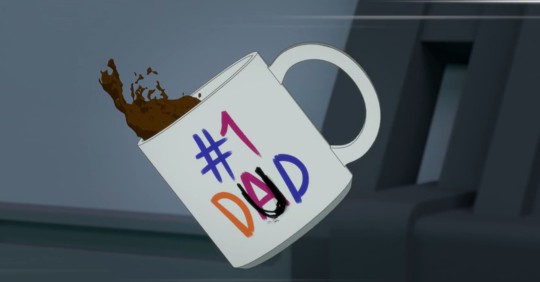
Seriously, what? This kind of “plan” only works with someone like Clover, where we know he has a good luck semblance and thus all these unlikely pieces fall into place. I could absolutely buy Clover smiling smugly, working under the knowledge that he just has to wait around a few minutes and something will come along that works entirely in his favor. But Nora? How did she know any of this would happen? Obviously she couldn’t have, so what exactly was their intention if this coffee carrying, hated guy didn’t show up? RWBY, your contrived plots are showing.
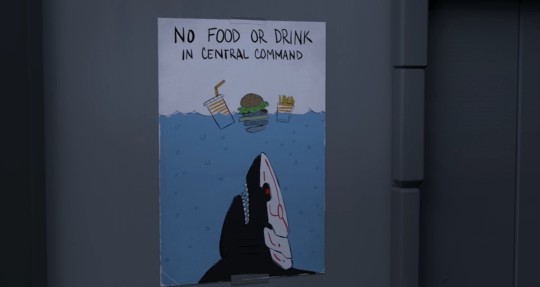
I do, however, love the grimm Jaws poster. Jaws is an absolute favorite of mine, so seeing a reference to it in RWBY? A funny one at that? It almost makes up for how bad this episode is lol.
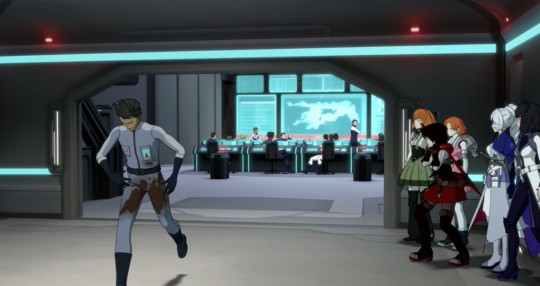
Because frankly I’m bored. The group sneaks around, criticizes May and Ironwood, briefly confuses me about Ruby’s semblance knowledge, and gets through tons of Atlas personnel in the stupidest way possible. I have to watch this guy running out of the room with coffee on his pants screaming, “WHHHYYY???” and he doesn’t notice the five girls standing right next to him. It’s silly. It’s boring. Luckily for RWBY, things are about to pick up in the second half.
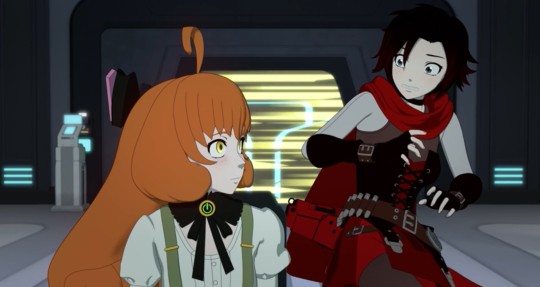
After Ruby gets them upstairs and the final room is also conveniently devoid of people, Pietro takes control of Penny—including yellow possession eyes like Oscar has with Ozpin—and he...gets Amity started. That’s it. After a whole volume of ‘It’s not finished yet’ and ‘We barely have the resources’ and ‘Robyn stole what we were using to do idek what with’ he presses buttons for a while and they’re in. How good for them!
I do love that Penny calls Pietro “Dad” though. I’m here for the android-father relationship.
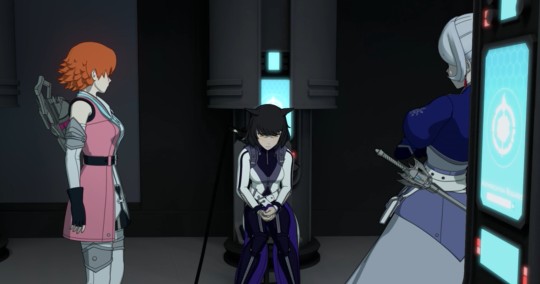
While Pietro works we turn to Blake, Weiss, and Nora. Blake tries to convince the audience that Ruby and Yang had an actual fight with, “I’ve never seen Yang and Ruby fight like this.” Yeah, because no one in this group has ever said the sliiiiightest thing against Ruby, so you all read the tinniest disagreement as a “fight” to be worried about. I mean, doesn’t RT have friends to draw inspiration from? They’ve never disagreed about Huge and Complex Questions before? Never gotten pissed and then shrugged it off the next time you want to text? RWBY’s idea of a diverse friend group feels like many other writers’ idea of a sibling relationship: anyone with an actual sibling goes, “What is this?” Speaking of, Weiss explains that sisters often have “very different ideas about what’s right” as if, again, people don’t have different ideas? Just in general? Why is this suddenly a sister thing? She’s clearly thinking about Winter, but doesn’t actually bring it up, so all we’re left with is the same situation we had last Volume. Weiss thinks she’s right, Winter is wrong, and they’re just going down their separate roads because there’s definitely no reason to re-examine any choices here. It’s all static.
Until Winter betrays Ironwood, of course.
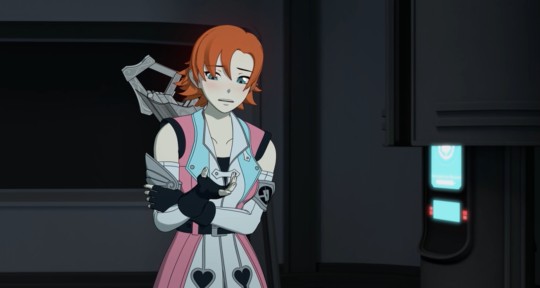
Nora tries to reassure Blake that the group will be fine (ha) even though they’ve split, the irony being that we, the audience, know they just got wrecked by the Hound. Jaune is a great leader though, Oscar has grown so much, Yang could defend them all in a fight, and Ren… well, she can’t think of anything to say about Ren. I hate the Nora is acting like Ren has drawn away from her for no reason, after she chose to kiss him—without consent—rather than listening to what was bothering him, then proceeded to pretend that this mystery problem never existed. What does she expect? I do, however, like the general acknowledgement that she doesn’t know who she is without Ren. Who is Nora? Someone who is “strong and hit[s] stuff?”
See, this feels like RT writing self-consciously because Nora doesn’t have much of a personality. Oh, on a surface level she’s bursting with it, but past the bubbly exterior? That single layer? We can add maybe one thing to this “Likes Ren, is strong, hits stuff” list: she’s funny. That’s it. Anything else we might add like “she’s loyal” or “she’s kind” is just a generic characteristic of this entire team. They’re all meant to be crazy talented good guys and even the “is strong” aspect is suspect when others frequently pull off attacks as showy as Nora’s hammer hits. So who is she? What are Nora’s dreams? What are her hobbies? Her fears? Her history? We’ve seen a single flashback of her on the streets and one scene back at Beacon where she listens to music and reads a magazine. Seven years worth of material and that’s it. There’s a reason why the go-to, non-combat action for Nora in fics is “makes pancakes.” We know so little about her still.
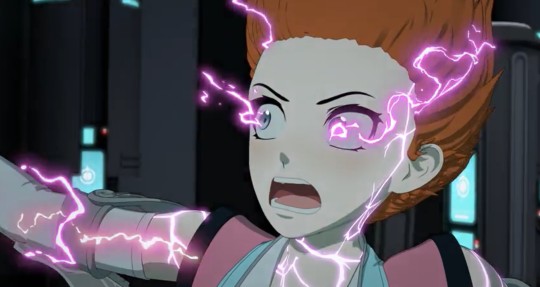
So I was excited for a brief, shining moment. Yes! Explore who Nora is outside of being strong and hitting stuff! … and then her big action this episode is, as she says, being strong and hitting something. Don’t get me wrong, outside of that setup it’s pretty epic. I like Nora going to those lengths to save Penny and I absolutely love the repercussions of the choice: a broken aura, passing out, and badass lightning scars all over her arms and neck (especially when women often aren’t allowed to accumulate scars in visual media). That’s pretty damn awesome. It’s just that it comes on the heels of the story insisting that Nora is more than this, that we’ll learn something new about her… and we haven’t. This is indeed cool, but we already knew that Nora was willing to crazy lengths by hitting things really hard. That’s already her established norm.
At least this moment has some really nice characterization alongside the stupidity. The conversation between Ruby and Penny is just plain stupid. Penny wants to stay to help with the evacuations, but Pietro says she should come with him in Amity. Why? As Ruby says, because then she’ll be up in the sky and Salem won’t be able to access the relic.
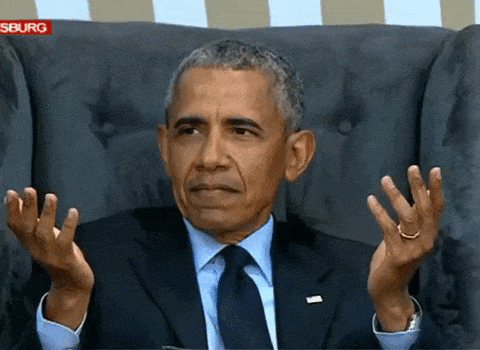
That’s what Ironwood wanted to do! We could have had this conflict episodes ago with you all working with him! I really can’t with this cast. Also, the rest of this is still confusing. I thought pretty much everyone was in the slums by now, so what evacuation are they talking about? Do they plan to evacuate everyone in Mantle out of the kingdom somehow… like Ironwood wanted to do with Atlas? And why are they acting like Amity is evacuating some people too? I thought they were just using it as a communication device? To add insult to injury, Ruby then contradicts herself a minute later when she tells Harriet that Ironwood can’t have the relic because “Salem will find her way to the relic no matter where you go.” Ruby, if Salem can access the relic high in the sky she can also access Penny in the sky. If you believe that literally nowhere is safe then why are you sending Penny away under the claim that she—and via her the Relic—will be safer? If you want Penny in Amity to lessen the chance of Salem getting the Relic, why can’t Penny be in Atlas while simultaneously (hopefully) getting a whole slew of people to safety?
I’m continually confused by this “plan” of theirs. Their claims just flip-flop according to what (supposedly) contrasts them with Ironwood. Even though that’s not actually the case.
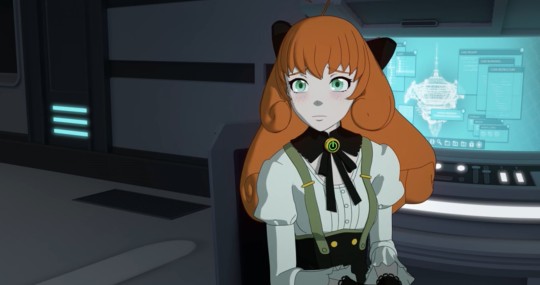
Penny is me, sad while watching this train wreck of a scene.
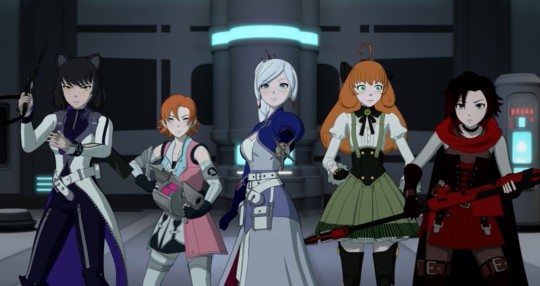
So yeah, the Ace Ops are here. I’ve wondered since the trailer why Weiss looked smug while everyone else was startled. Turns out it’s because of her line, “So, your first time losing to us wasn’t enough?” I can’t express how much I dislike all the girls’ personalities now. I want to shake some compassion and humility into them. Plus, they never should have won that fight in the first place. Marrow yells, “We were holding back!” but coming from the team’s weakest member it reads as defensive. Like we’re supposed to go, ‘Lol yeah right, Marrow. Just admit you got your ass kicked,’ even tough the Ace Ops should have wiped the floor with them, holding back or not. That’s my biggest takeaway from this fight: it’s the reverse of what we should have gotten. The Ace Ops should have beaten Team RWBY with ease and struggled greatly against an android Maiden, not falling before a bunch of teens and succeeding against Penny if not for Nora’s timely breakthrough. Your half-trained cast of growing heroes should not come across as more powerful than an intelligently designed weapon now wielding magic.
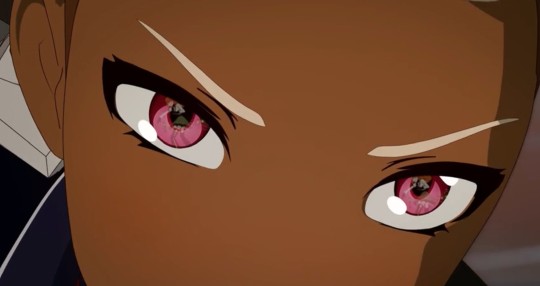
Before the fight starts we get a whole lot of lines that are, frankly, frustrating. Vine tells Penny, “I thought you were supposed to protect the people, not hurt them” which is true enough. Penny is taking action that is putting a lot of people in danger, regardless of the fact that Ruby is at the helm. Problem is, the Ace Ops then blame her for Winter’s injuries and “stealing” the power? That’s not the issue here. The issue is Penny’s blind loyalty to Ruby, but by having the Ace Ops back a stance that is clearly inaccurate—Penny didn’t cause Winter’s injuries, Cinder did; Penny didn’t steal the powers, she was encouraged to take them—it makes them come across as Very Evil people who will twist things to make poor Penny look like the villain. Even if this is a case of Ace Ops having bad intel (which seems unlikely. Wouldn’t Winter have told them what happened?) RT has avoided letting the Ace Ops take a justified stance here because that would make them look too sympathetic… even though they do have multiple justified stances to take. Like, ‘Hey, stop keeping half a kingdom here where Salem can easily kill them all’ or, ‘Hey, why did you spend months betraying Ironwood and then turn on us instead of trying to find a compromise?’ Even, ‘Why did your uncle help kill our leader?’ There’s plenty that the Ace Ops should be rightfully pissed about, so choosing Penny and Winter out of everything feels like RT is firmly backing them into Ironwood’s corner: you’re just bad now and bad people blame innocent girls, rather than acknowledging the actual wrongs done against them.
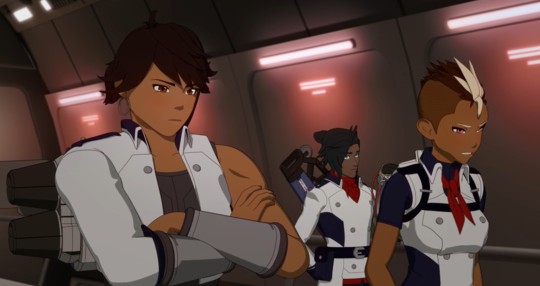
So we have Ruby contradicting herself and the Ace Ops backing warped ideas that make them look worse than they actually are. Adding to the stupidity is the fact that Elm mentions that Winter is in “critical condition” and Weiss… doesn’t care. Harriet then tells Ruby that she’s “throwing [her] in jail right next to your uncle, runt” and... Ruby doesn’t care. Qrow is missing and Ruby just found out he’s been captured by Ironwood, yet there’s no reaction whatsoever. This show continues to go hard on the ‘screw adults’ mentality, huh? Ozpin needs to keep quiet and is horrible for coming back. Ironwood is now a cartoon villain. Winter made the wrong choice so no one cares about her anymore, not even her sister. The Ace Ops remain enemies despite trying to talk things out. Qrow? Barely know him. Who’s he? This is a Ruby loves Penny episode. There isn’t enough emotional nuance for her to care about him too.
The sad thing is I adore Nuts&Dolts. In a different context these moments would be a goldmine for me.
If anything, this episode feels worse than the majority of last week’s because there are good things here that have been thrown into a bad setup. I can’t get excited for the group’s battles when I see who they’re attacking. It’s hard to squee over Ruby hugging Penny when she doesn’t react to Qrow. Watching Nora go all Thor feels like it only has half its potential when it’s coming out of a very messing, ‘I’m more than just being strong and hitting things… which is why I’ll continue being strong and hitting things.’ RWBY has excellent moments set into a terrible story.
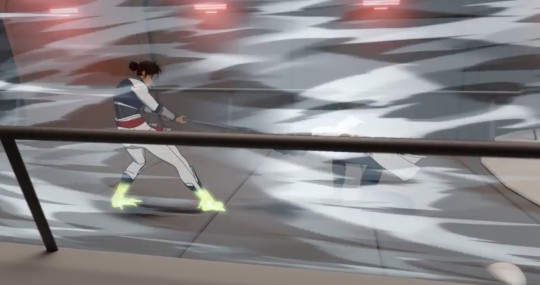
The fight, at least, is exciting. The Ace Ops goad Penny into stepping away so they can trap the rest of Ruby’s team—smart—and she’s forced to hold her own while Weiss tries to break through with her knight, then Nora overloads the system. To be frank, I’m not great at analyzing combat. Not unless I’m looking for something specific like whether a win is justified. I’ve already mentioned above the broad issue of the Ace Ops very nearly beating the most powerful fighter next to Salem herself, yet failing so spectacularly against Team RWBY. Outside of that context though? I really enjoyed this. Lots of tight action, creative attacks, teamwork, some emotional pauses throughout… it feels like a pretty solid battle. Put it on Youtube as a clip, outside of the rest of the story’s messiness, and you’ve got yourself a fantastic watch.
We can’t stay in the combat forever though. During all this Weiss calls the Ace Ops “cowards” for making it four vs. one. You know, RWBY should really just do away with dialogue and make the show purely action because the cast frequently sounds so stupid when they speak. Like her comment about Ironwood’s lockdown… really Weiss? ‘Yes, we might be wanted criminals who betrayed this group in the worst possible way, but how dare they not do the honorable thing and have three of their teammates sit out while trying to capture us? Even though the girl they’re trying to capture has magic. I mean, the nerve of them!’
Weiss, at this point I’m not sure how to explain to you that the people you’ve made into your enemies do not owe you a fair fight.
Another detail: we get to see Ruby fall off the edge of the walkway and this time she remembers she can fly! A definite improvement from Volume 6.
Finally: by the time Penny’s eyes go full Maiden in Elm’s grip, I think we’ve seen everything from our trailer. Episode 4 will truly be a mystery.
Ironwood has, of course, been watching the fight this whole time. When it looks like the Ace Ops will lose against the team he means to send in reinforcements, but Watts says he has “a message for your operatives.” Instead of capturing Penny they steal one of her swords instead, ending with a shot on Marrow looking conflicted.
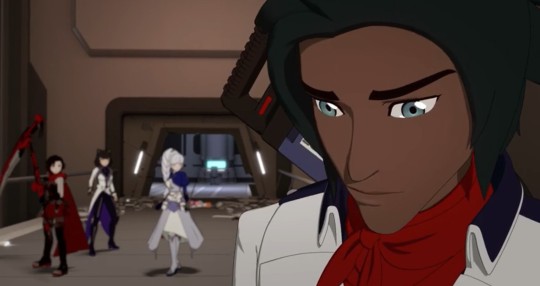
Because remember, there’s no actual moral grayness in this story. The protagonists are right and everyone else is wrong. It’s (supposedly) black and white. Which means that if the Ace Ops have any hope of surviving this Volume and being seen as anything other than evil bootlickers, they have to join with Ruby. Marrow seems primed to do that.
Am I surprised? No. Disappointed? Always lol.

May has the airship ready to go and they fly off… despite the shields. And the lockdown. Consistency? Who’s she? Nora is said to be “in bad shape” and after another hug Penny leaves to hide in Amity, even though Ruby thinks that hiding is a useless, cowardly choice. Just not when she and her allies choose to do it.
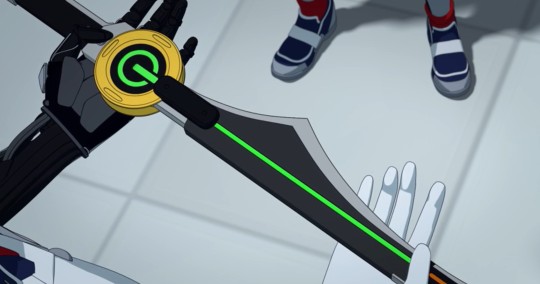
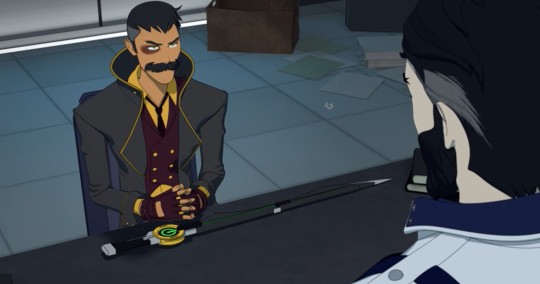
We end the episode with Watts receiving Penny’s sword and making the statement, “If you can’t beat them… then make them join you.” I have to say, his cheesy villainy is something I continue to enjoy, even if it’s heavy handed at times. Watts is just fun. I do have to say though: if Penny is hacked, what does that say about her agency? We double-downed on the ‘real girl’ narrative by giving her the Maiden powers, but she’s simultaneously synthetic enough that a single piece of her can remove all autonomy? It once again feels like RT isn’t sure what point they’re trying to make, they’re just chucking a lot of themes at the wall and seeing what sticks. Still, we’ll have to let it all play out before making any judgements.
And that’s it for this week. It seems like this is a slightly shorter recap than normal, though that may be because I struggle with discussing pure action sequences, which made up a decent chunk of this episode. I’ll no doubt return to the Ace Ops vs. Penny fight when I’m not on a self-imposed, one day deadline for posting. The only thing left is to update the Bingo Card, but I don’t think we made any headway this week. So... good job, RWBY?
I’m still going to hold off on the civilian’s square until Salem’s army actually attacks, as well as the two day timeline square.
No Winter this episode
Watts is teaming up with Ironwood which is… so much worse than him teaming up with Jacques again. Does a square get an X if the canon is even worse than what you assumed it would be??
Maria was mentioned this episode. Jury’s out on whether she’ll actually do anything.
Atlas is still standing, we knew Penny was heading towards a hack so it’s not much of a cliffhanger, no Qrow, no Ozpin, no Neo or Cinder.
It certainly looks like we can check off “The team gets Amity up and running,” but let’s just see if there are any problems next episode. If the problem is only ‘We would have launched it if not for Salem’s attack’ or something, I’m checking it off. The point is it would have worked.
I’m also leaning towards “More obvious Blake/Yang implications without confirming a relationship” given Blake’s heart-to-heart with Nora… but let’s see if the Volume does anything more egregious.
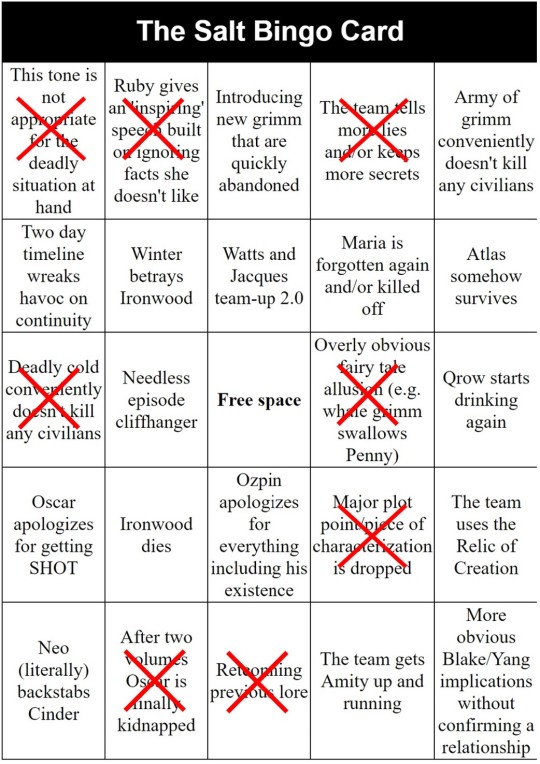
All in all (and perhaps despite what I’ve written above), I don’t think it’s fair to totally drag this episode. As said, this feels like a strong episode in a bad story, something that I would have LOVED if a) Salem weren’t here and b) the ‘ethical dilemma’ wasn’t boiled down to a ‘Team Ruby is good’ and ‘Ironwood and everyone associated with him is evil’ situation. It’s an episode whose tone and character action belong in a different version of RWBY. If you gave us this fun episode in an earlier Volume against a Pure Evil antagonist? It would have been great.
Ah well. It is what it is. Expect more emotional whiplash when we come back and everyone learns that Oscar has been kidnapped by Salem’s talking pooch 🙃
See you then! 💜
#rwby#rwby spoilers#rwby volume 8#rwby strings#mymetas#rwby recaps#apologies if this Recap is messier than normal#I have a zoom meeting in five minutes lol#gotta go fast!
54 notes
·
View notes
Text
Blue is, in fact, not only the Warmest Color, but her name is Emma - Alec Thomas
Blue is the Warmest Color is a 2013 film adaptation of a comic series of the same name, made by Julie Maroh in 2010. This film follows a French teenager named Adele, who is what seems to be very introverted and unsure of her place in the world. Adele dates a boy named Thomas at school, but when they eventually have sex for the first time, Adele is left unfulfilled by Thomas, realizing there might be more to her sexual identity than she knows, and decides to break off their relationship. Her openly gay best friend Valentin hears about her confusion, and decides to take her out to a men’s gay bar. Adele leaves Valentin and wanders off to a neighboring lesbian bar, where she ends up meeting Emma, the blue haired girl who is also a graduating art student. The two have resounding energy off one another almost immediately, and they become friends quickly. It isn’t long after that they kiss for the first time during a picnic, before they bloom into a full relationship with one another. Emma’s family is very welcoming of Adele’s presence and relationship, while Adele’s more conservative parents are told Emma is a tutor for Adele’s philosophy class at school.
The film fast forwards a few years, and we see Adele and Emma living together while they continue their jobs. While Adele finishes school and gets a job teaching at an elementary school, Emma tries to further her painting career by throwing parties to socialize among her art peers. It’s at one of these parties that we meet Lise, a pregnant old colleague of Emma’s. Emma makes fun of Adele’s current job choice, saying that her writing could do exceptionally well, and Adele asserts that she’s much happy with where she’s at now. It’s here where we see some disparities come to light, as it seems like Adele and Emma don’t share that much in common even anymore, and out of loneliness, Adele sleeps with a male coworker. Emma finds out about the affair, and subsequently and ferociously kicks Adele out, ending their relationship. 3 years pass before they end up meeting again, only to find out Emma is now in a relationship with Lise and has a family with Lise’s daughter, while Adele still cannot overcome her heartbreak. Adele expresses how in-love she is with Emma, and despite their strong connection, Emma declines, but tells Adele that she’ll always have an “infinite tenderness” in her heart for her. More time passes before we see the two convene one last time at one of Emma’s art exhibits, where the two meet, but don’t really connect. It’s clear that Emma would rather tend to all her patrons and guests at the party, so Adele congratulates her before quietly leaving the exhibit. The film ends. I argue this film is a generally a great depiction of a heart wrenching love tale between two women, which effectively explores themes of sexuality and queerness explicitly, in order to create a film that leaves audiences wanting more among an ambiguous ending.
youtube
This movie definitely connects with some of the talking points we’ve discussed in class. Probably one of the easiest examples we see coming to light is in one of the first scenes in the film, where Adele’s friend group displays some signs of heteronormativity. In the clip above, we see Thomas staring at Adele from afar, with Adele’s friends insisting they’re “so obviously into each other”. Adele then begins to tune out of the conversation as the rest of the group starts discussing other cute boys, while Adele remains silent, clearly uncomfortable to some degree. It’s clear here that Adele’s friend group is using heteronormativity in the sense that they believe Adele is straight, despite no context being added whether they’ve discussed this before. Seeing as how the rest of the film pans out, they clearly haven’t discussed this. “For queer theorists, sexuality is a complex array of signifiers, social codes and forces linked to institutional power which interact to shape the idea of normal or deviant, good or bad, and which has the function of including and excluding people,” (Andersson, 2002, p. 3). In this scene, Adele is unsure of her sexuality, but it is clear how it should be demonstrated among the institution of her school in the ways of heteronormativity. This environment excludes any notion of queerness existing normally, which is reinforced by Adele’s friend group. This becomes problematic for Adele, as it feels as though Adele is almost pressured into going out and sleeping with Thomas because of her friends' heteronormativity enacted upon her. She is then only left to be unfulfilled, simply because she wasn’t attracted to men it seems at this point.
youtube
The above clip happens once Emma and Adele start spending more time together, and Adele’s friend group at school seems to pay attention to this fact. They all begin to grill and question her about where she met this girl, only to find out it was at a gay bar. Her “friends” then start getting heated with Adele, begging her to “fess up” to being lesbian, and to “just admit it”, while another girl starts making remarks about how she doesn’t care if Adele is lesbian, but that she’s slept naked in her bed a few times and seen her checking out her ass, calling Adele a “whore”, and then asking the question “Does your bitch have a blue p---y?” before Adele starts to fight. While this is clearly homophobia, it’s carefully inserted into the film to show some of the general public’s opinion on gay or lesbian reception, those of which lines match pretty well with Adele’s parents ideals. You could compare this to a time where “homosexuals” were compared to Communists in the U.S. “Communists bore no identifying physical characteristics...Homosexuals too could escape detection...Because most people confronted with accusations of homosexuality during these witch-hunts quietly resigned, it is impossible to determine the number of careers and lives that were destroyed.” (Gross, 2001, p. 22). This scene almost plays out like an interrogation or a witch-hunt of Adele, which I think draws on some lines on queer folk having to “admit” their queerness publicly, while cisgender folk never have to admit their sexuality in the same way. This part especially demonstrates queerness in a real world lens. To me, this scene was put into the film in order to demonstrate the harsh world that queer folk often experience. It’s made for the audience to have a better understanding of Adele’s current position, and therefore allows the audience to become more compassionate with Adele’s struggles along her life, for simply choosing who she wants to love.
Another dominant theme we see arising out of this film is sexuality and pornography. That being said, I wouldn’t recommend watching this film with your parents in the same room, because boy, you would be in for a trip. The film’s graphic sex scenes are all pretty exposed for Adele and Emma, leaving almost literally nothing to the imagination of the audience. I think this is done in the film because it wants to show the raw and unfiltered bodies of the two lovers, and more obviously done to display queer love on screen. “Queer film study, then, understands cinematic sexualities as complex, multiple, overlapping, and historically nuanced, rather than immutably fixed...queer film study explores how and why the fluidity of all sexualities relates to the production and reception of cinema.” (Benshoff & Griffin, 2004, p. 2). We especially see this sexual fluidity occur within Adele, when she sleeps with Thomas at the beginning of the movie, along with her fling with a male coworker that ultimately ended her relationship with Emma. Adele’s sexuality isn’t ever exactly defined, which leaves it ambiguous to the audience, therefore showing that even Adele is still discovering what her sexuality is exactly. While the sex scenes are explicit, to me, I wouldn’t qualify them exactly as porn, because they are also increasingly dramatic with expression. In a way, if we didn’t have these scenes, I don’t know if the audience could even understand the level of obsession that Adele and Emma have for one another. It’s in these scenes that we get just a glimpse of what it means to love as humans, and how sex is one of many facets to deepen our love for one another.
youtube
For myself, the above clip is one scene in particular where I think the movie doesn’t really hit the nail on the head. In the scene as discussed in the intro paragraph, it features Adele and Emma in a restaurant, a few years after they’ve broken up, with Adele confessing her deep love for Emma again. Emma declines Adele’s love, citing that she’s with someone else now, and thus leaves. Before Emma is able to do that however, there’s a pretty lengthy portion of the clip where the two begin to passionately make out with one another, even getting to literal third base blatantly happening at the dinner table. Don’t get me wrong, my issue isn’t at all with any of the pretty graphic sex scenes in the movie, but this one in particular stands out because it’s literally in public. Literally a waitress confirms an order for coffee before the scene starts, and then the camera even pans out at the end of the scene to witness two other customers dining a few tables away. I felt like this part ran into a few problems, since both Adele and Emma completely ignore everyone else in the room in order to sexually fulfill one another, which for me not only feels a bit insensitive to not only the other people in the restaurant, but a bit unrealistic and hypersexualized. I think this part is more damaging to queer identities, in the sense that the ideal is being pushed that when it comes to sex, they are completely unable to control themselves for their lust for one another. You also get a sense of the power of looking at these characters by the minor characters in this scene, which pins them as public interpretations of sexuality inside the restaurant unfairly. They are more than just the objects of lust being viewed upon by other customers and work staff, but this scene doesn’t help that argument whatsoever.
Much like most things in the movie, the ending is completely ambiguous. You see Adele walk off around a street corner, to supposedly never talk to Emma again. We see this love come together, fall apart, and have a smidge of possible recovery, only to be let down again. Shortly put, I wanted more out of this story, because it felt like it wasn’t over. Maybe the reason it ended was to show that things don’t always have a “Happily Ever After”, especially when it comes to real life. Overall, for myself as a cisgender white straight man, I think this film is great in terms of queer media exposure. I think white and straight people have been given too much in terms of amount of privilege, especially when it comes to roles in love stories in cinema. I was forced to be critical when it came to my analysis of this movie, simply because I wasn’t the identity featured in this movie. I had to interpret information from a queer lens, which made me more objective and honestly a bit uncomfortable - but in a good way. I was forced to feel and see the things these characters were experiencing, in the exact same exposed ways they were seeing them. In a way, I think that made me more drawn to the story, simply because I was experiencing something that I had never gotten the chance to see anywhere else. The fact that the entire film is in French plays a big role as well, as I noticed I was using a lot of nonverbal cues in order to determine how a character might feel at any point in time. To conclude, I think this movie does a mostly great job on representing queer identities in order to create a love story that is unequivocally matched to any other story you see. It hits on the realistic parts of life and love that humans experience, in order to show how rough love can truly be.
References
Andersson, Y. (2002). Queer Media? In E. Kingsepp (Ed.), Media Research in Progress. Stockholm: Stockholms University.
Benshoff, H., & Griffin, S. (2004). Queer Cinema the Film Reader. New York, NY: Routledge. Taylor & Francis Group.
Gross, L. (2001). Up from Invisibility: Lesbians, Gay Men, and the Media in America. NEW YORK: Columbia University Press. doi:10.7312/gros11952
25 notes
·
View notes
Text
Why I’m Deeply Concerned about Denis Villeneuve’s Dune and You Should Be Too
Let me Preface this by acknowledging Dune has yet to be released so it may very well be that many if not all of my concerns and frustrations will prove unfounded. Furthermore Dune was a novel published in 1965 by an extremely homophobic*, cis-gendered and heterosexual white man so I am by no means arguing deviations shouldn’t be made from the original text. They absolutely should especially because the series themes about human complexity and questioning authority seem depressingly timeless and deserve repeating.
However- in the original novel the Fremen were explicitly based on the Bedouin cultures of North Africa and MENA inspired elements permeate all aspects of the culture in Dune, both Fremen and Outsider. Yet despite two adaptions (three if you count SyFy’s adaptions of Dune Messiah and Children of Dune) none have cast MENA performers or tapped anyone of MENA origin to work behind the scenes (Denis Villeneuve’s adaption included).
This current adaption has instead chosen to cast almost exclusively Black actors as the Fremen. I say ‘almost’ because Stilgar, one of the Fremen leaders in the book is played by the white Javier Bardem.
While there is some potential narrative justification for the Fremen being Black as it’s mentioned in the book the Fremen are descended from a slave race and the term Fremen is actually derived from ‘Free men’ after several of these former slaves escaped into the desert.
Fremen tradition says they were slaves. . . for nine generations. -Terminology of the Imperium, Dune
Though that potential justification is weakened since Javier Bardem is again white. It also doesn’t help that Paul Atreides (played by the equally white Timothée Chalamet) is poised to also take on a leadership role both secular and religious amongst the Fremen as a long awaited warrior prophet and messiah.
MENA actors make up less than one percent of current television roles and have equally small presense on the big screen. When they are shown they usually only given stereotypical roles and rarely make any kind of headway in genre films like science fiction and fantasy. It’s a depressing lack of inclusion of people who are quite literally the inspiration for the novel.
Which brings me to the character of Liet-Kynes who’s casting I am most disturbed by. (Spoiler Warning for the 55 year old book from here on out). In the book Liet-Kynes is a half-Fremen man who acts as not only a leader amongst the Fremen but is also able to pass largely undetected in non-Fremen society because of his mixed heritage. Something he uses to protect his people from a largely hostile ruling class but as a man of science remains deeply skeptical of his peoples’ prophesies surrounding Paul Atreides’ messianic potential. (With good reason it turns out as those ‘prophecies’ were largely planted by the outsider Bene Gesserit Sisterhood for their own ends) While he’s initially won over by Paul and his father Duke Leto’s charisma he later comes to regret giving them his allegiances realizing as he dies the danger a messiah like Paul poses to the Fremen culture’s integrity.
No more terrible disaster could befall your people than to fall into the hands of a Hero. . . Dune, Chapter 22
Frank Herbert even has Liet’s body circled by hawks who are the traditional emblem of the Atreides to hammer the point home that the Atreides will be feasting themselves on the vulnerable Fremen.
To put it bluntly Liet’s narrative purpose is to die leaving no room for the Fremen or the larger Dune universe the chance to escape the chaos Paul’s messianic destiny will bring. And Denis Villeneuve has chosen to cast Sharon Duncan-Brewster a Black woman in this role. Assuming Liet-Kynes’ character follows a similar narrative arc as presented in the original novel we are going to be presented with a Black woman who comes to believe a white boy is her long awaited messiah and then be disposed of.
We are in something of a long needed cultural reckoning. Where we have been forced to acknowledge how constantly we have treated not only Black people but Black women as disposable. So in addition to the deliberate lack of MENA cast in any roles let alone Fremen I find this particular change not only tone-deaf but down right despicable. Even worse the film will be including the characters Jamis and Harah. Jamis is a man who Paul kills early into his introduction to Fremen society and who’s widowed wife Harah then tries to seduce to secure her own life but that of her two orphaned children. Which smacks of a multitude of racial stereotypes.
As a queer fan of the books who frequently enjoys dragging Frank Herbert for his authorial inconsistencies and eccentricities (he had a recurring obcession with athletically built red heads with oval shaped faces and wide generous mouths) I am all for radically altering the books’ text. But I am not seeing that with this adaption. Instead it feels like a poorly thought out attempt at diversity as conceived by three white, cis-het white men and I for one will not be watching.
Foot Notes and Sources Cited
* Bruce's homosexuality was had never been accepted by my father, and they had never reached full rapprochement. Still, when my brother came to Seatle he broke into tears while riding in the backseat of my car. Penny and Jan consoled him. My brother told me later that he didn't cry from love, because he didn't feel he loved the man. He said he cried from what he had never experienced in the relationship between his father. I missed almost everything," Bruce said. "I never saw the good side he showed you. He wasn't there fore me." He went on to say that he couldn't watch movies or television programs having to do with father-son relationships, because they upset him so much. I told him that Dad loved him, that he spoke of him often and fondly, and that he just didn't know how to show it. I reminded Bruce of all the ways he emulated our father, and of the many interests they shared . . . electronics, computers, science fiction, photography, flamenco guitar . . . and I asked if that could possible mean that he loved Dad after all. My brother fell silent. -Brian Herbert, Dreamer of Dune
Ramos, Dino-Ray. “Study Shows Bleak Middle Eastern & North African Representation, Reinforced Stereotypes On Primetime TV.” Deadline, Deadline, 10 Sept. 2018, deadline.com/2018/09/middle-eastern-north-african-representation-primetime-tv-mena-quantico-blacklist-tyrant-diversity-1202458101/.
Ramos, Dino-Ray. “'Dune' Trailer: Denis Villeneuve & Cast Talk How Adaptation Of Sci-Fi Classic Will Engulf Audiences On An Epic Scale.” Deadline, 9 Sept. 2020, deadline.com/video/dune-trailer-denis-villeneuve-timothee-chalamet-rebecca-ferguson-oscar-isaac-warner-brothers-sci-fi/.
Coleman, Itané O. Http://Www.ncurproceedings.org/Ojs/Index.php/NCUR2017/Index, 2017, www.ncurproceedings.org/ojs/index.php/NCUR2017/article/view/2246.
HERBERT, FRANK. DUNE. ACE Books, 1965.
Herbert, Brian. Dreamer of Dune: the Biography of Frank Herbert. Tor, 2004.
Please Donate to Black Lives Matter
9 notes
·
View notes
Text
Camille Has Many KDrama Thoughts
As some of you have possibly noticed, I have recently fallen into a KDrama hole and I can’t get up, and I have just finished my 10th drama, which seems like less of an accomplishment than I thought now that I say it out loud, but anyway,
As a checkpoint/thinly veiled plug of some shows I love very much, here is a very long post with some of my thoughts on all the KDramas I’ve seen so far, as well as what’s next on my list, in case you too were interested in joining me in nonexistent fandom hell!
So firstly, all of the dramas I have watched to completion, in the order of how much I like them. First, my top five:
1. Sungkyunkwan Scandal (2010). My #1 favorite drama to date. I’ve probably watched it in full 4-5 times, and it’s still an absolute treat every time. Is it the best drama I’ve ever seen? Probably not. But it’s so fun and charming that it’s just gotta be at the top of my list.
The best way I can describe this drama is Ouran High School Host Club, except in Joseon era Korea, and instead of flirting with girls the main characters learn about Confucianism and solve mysteries and play sports (twice) and end up accidentally involved in a complicated political scandal. Also, that one text post about how Shang from Mulan is bi because he falls for Mulan while he thinks she’s a man...This drama has that, except actually canon. And while I won’t pretend this is show is a shining beacon of representation, there are multiple main characters who are explicitly not heterosexual and several others with very plausible queer readings, which earns it a very special place in my heart.
As for the actual premise of the show, it’s basically about a wonderfully determined and kind and clever but lower-class girl whose writing skills catch the eye of the most stubbornly strait-laced but idealistic aspiring politician-type on the planet. She ends up getting a one-way ticket to the most prestigious school in the country, except she has to pretend to be a man the entire time because women aren’t allowed to be educated at this time.
It’s a bit of a silly, cheesy show, and here are many wacky shenanigans, but the main cast is full of incredibly highly endearing and multifaceted characters, there is a lot of sexual confusion, the slowburn roommate romance has an incredible payoff, and it’s also full of deeply moving social commentary about class, privilege, and gender roles. This drama is a blast and I could go on and on about what I love about it, I absolutely adore it to pieces.
2. Six Flying Dragons (2015-2016). I debated between this and Tree With Deep Roots (next on my list, to which SFD is a prequel) as my #2 but I do think I want to place SFD higher just because it's the drama that I keep thinking about even after finishing it. of course, it has the dual advantages of 1) being released chronologically later (and having better production value, etc., because of this) and 2) being twice as long, but there’s just so much stuff to unpack with SFD that it makes me want to keep coming back to it.
The show is about the founding of the Joseon dynasty, and six individuals (half of whom are based on real historical figures and half fictional) whose lives are closely tied to the fall of the old regime and the revolution that brought in the new. It has an intricate, intensely political plotline based on the actual events that happened during this time, and though this may sound kind of boring if you’re like me and not super into history (admittedly, the pacing in the beginning is a tiny bit slow), it quickly picks up and becomes this dense web of character relations and political maneuvering. Though none of the major events should come as a surprise if you’ve seen TWDR or if you happen to already know the history it was based on, the show adds such a depth of humanity and emotion to every event and character that nothing ever feels boring or predictable. As a matter of fact, there are several events that were alluded to in TWDR that, when they actually happened in SFD, left me breathless--because although I 100% knew these were foregone conclusions that were coming up at some point, I still had a visceral moment of, “oh no, so that’s how that came to happen.”
But though I really enjoyed following the story of SFD and learning about the history behind it, the highlight of the show for me is definitely the great character arcs. I loved TWDR’s characters, too (especially Yi Do, So Yi, and obviously Moo Hyul), but with double the episode count SFD just has so much time for rich, dynamic character development, and I absolutely loved seeing how these characters grew and changed over time when their ideologies and fates collided in this turbulent and violent age: How young and ambitious Yi Bang Won eventually spiraled into a ruthless tyrant, how the naive and kind-hearted Moo Hyul struggled to retain his humanity in a bloody revolution that challenged his values and loyalties to the core, how the fiercely determined and idealistic Boon Yi grew into a pragmatic and capable leader who comes to realize what politics and power mean for her and her loved ones.
SFD was also everything I wanted as a prequel to TWDR--I loved seeing the contrasts between some of the TWDR characters and their younger selves in the SFD timeline: The hardened and ruthless Bang Won as a passionate and righteous adolescent, the cynical and resigned Bang Ji as a cowardly boy who grows into a traumatized and bitter young man, and my personal favorite character, the comically serious bodyguard Moo Hyul as the very model of the dopey, lovable himbo archetype. And though the ending was controversial among fans (particularly those who watched SFD first), I loved how it closed all the loops and tied it back to the events of TWDR, both providing that transition I wanted but also recontextualizing and adding new meaning to the original work. I think it's still a very good drama on its own, but this hand-off is what really sealed the deal for me personally, because it was not only super emotionally satisfying to watch how the stories connected, but it elevated TWDR to something even greater (suggesting that Yi Do and the events of TWDR was the culmination of everything the six dragons fought so long and hard for), which is exactly what I expect from a good prequel.
I’ve already talked so much about this drama but I also do need to mention that the soundtrack to SFD is A+, and the sword fights are sick as hell. There is also some romance, though it’s not really a focus--and all the pairings that do exist are extremely tragic, which is exactly up my alley. Overall, this is a hell of a historical drama, coming of age, villain origin story, and martial arts film in one, and I highly recommend it.
3. Tree With Deep Roots (2011). The sequel to SFD, though it aired first chronologically. Although this show isn’t one of those shows that I could rewatch once a year like SKKS or keep ruminating on like SFD, TWDR (much like Les Mis, or Fata Morgana) is thematically the kind of story that just makes my heart sing.
The story centers around the creation of Hangul, the Korean alphabet, by Yi Do (a.k.a., King Sejong the Great, who is the son and successor of Yi Bang Won, the main character of SFD) as well as two fictional childhood friends whose backstories and ambitions become central to the story of how and why this alphabet came to exist. Not only is the actual process of creating this alphabet absolutely fascinating from a linguistic and scientific POV, but the show dramatizes Yi Do’s motivations in a way that’s so incredibly touching and human--portraying the king as a soft-hearted and extremely charismatic yet fundamentally flawed and conflicted figure who tries so desperately to do right by his people.
The show explores both a number of personal themes like redemption, atonement, and vengeance, as well as broader societal themes such as the ethics of authority, the democratization of knowledge, and the power of language and literacy. Though the show never forgets to remind the audience of the bitter reality of actual history, it’s still a deeply idealistic show whose musings on social change and how to use privilege and power to make the world better are both elegant and poignant.
Romance definitely takes a backseat in TWDR, even more so than SFD, though this isn’t something I personally mind. There are, however, a lot of interesting politics surrounding the promulgation of the alphabet, including a string of high-profile assassinations--if SFD is historical/political-thriller-meets-action-film, then TWDR is historical/political-thriller-meets-murder-mystery, and it’s an incredibly tightly written and satisfying story whose pieces fall into place perfectly. Though not the sprawling epic that SFD is, TWDR is an emotional journey and an extremely well-written story with a TON of goodies if you’re as excited about linguistics as I am.
4. White Christmas (2011). My first non-sageuk on this list! White Christmas is, in a lot of ways, an odd drama. It’s an 8-episode special, and featured largely (at the time) new talent. it’s also neither a historical work nor romance-focused, but instead a short but intense psychological thriller/murder mystery.
The premise is this: Seven students at a super elite boarding school tucked away in the mountains receive mysterious black letters that compel them to remain on campus during the one vacation of the year. The letters describe various “sins” that the author accuses the students of committing, as well as the threat of a “curse” as well as an impending death. The students quickly find that they’re stranded alone at the school with a murderer in their midst, as they are forced to confront their shared histories and individual traumas to figure out 1) why they’ve been sent the letters, and 2) how to make it out alive. At the center of the survival game the characters find themselves in is a recurring question: “Are monsters born, or can they be made?”
If you’ve been following me for a while, it’s easy to see why I was drawn to this drama. In terms of setup and tone, it’s Zero Escape. In theme, it’s Naoki Urasawa’s Monster. It’s Lord of the Flies meets Dead Poets Society. or as one of my mutuals swyrs@ put it, Breakfast Club meets Agatha Christie. The story is flawlessly paced with not a scene wasted. There’s so much good foreshadowing and use of symbolic imagery, and though I’ve watched it at least 3-4 times, I always find interesting new details to analyze. The plot twists (though not so meta-breaking as ZE) are absolutely nuts, and aside from the somewhat questionable ending, the story is just really masterfully written.
Above all, though, WC is excellent for its character studies. Though I typically tend to stay away from shows that center around teenagers because I don’t find their struggles and experiences particularly relatable, WC does such an excellent job of picking apart every character psychologically, showing their traumas, their desires, their fears, and their insecurities. We see these kids at their most violent and cruel, but also their most vulnerable and honest. Their stories and motivations are so profoundly human that I found even the worst and most despicable characters painfully sympathetic at times, as cowardly and hypocritical and unhinged as they became.
Like I said, it’s only 8 episodes long with probably the best rewatch value on this list. My only complaints about it are its ending, as well as its relative lack of female characters, but otherwise I would absolutely recommend.
5. Signal (2016). Okay, this might be the recency bias talking because I just finished this series but I'm sure but I'm still reeling at the mind-screw of an ending and I feel like it deserves a place on this spot just for that.
Signal is a crime thriller based on a number of real-life incidents that happened in Korea in the last 30 or so years. In short, a young profiler from the year 2015, who has a grudge against the police after witnessing their incompetence and corruption twice as a child, happens to find a mysterious walkie-talkie that seems to be able to send and receive messages from the past. on the other end is an older detective from 2000 who tells him that he’s about to start receiving messages from his younger self, back in 1989. Through the seemingly sporadic radio communications, the two men work together to solve a series of cold cases, which begin to change the past and alter the timeline.
As they solve these cases, expose corruption within the police department, and correct past injustices, the two men (along with a third, female detective who has connections to both of them) also begin to unravel the mysteries of their pasts, as well as why and how they came to share this connection.
Like WC, the story and pacing of this drama were flawless, reminding me of an extended movie rather than a TV series. I was on the edge of my seat the entire time, and the 16-episode run went by in no time at all. I always love timeline shenanigans and explorations of causality and fate and the consequences of changing the past, and this show has oodles of that peppered with the heartbreakingly tragic human connections and stories that the main characters share. The main pairing has great chemistry and gave me exactly the pain I crave from a doomed timeline romance, and the cinematography and soundtrack were also beautiful, which also contributed to the polished, cinema-like feel.
My only complaint is that I wish that the ending felt more like an ending, such that the drama could stand on its own. I do realize this is because there’s a second season coming, but right now the show feels somewhat incomplete, ending on a huge, ambiguous cliffhanger/sequel hook and with several loose ends. I obviously can’t give a final verdict until the entire thing airs (and I typically don’t like multi-season shows, so I will wait for the next season to come out both reluctantly and begrudgingly), but even where the show leaves off I still did enjoy it immensely.
...And now, some brief thoughts on the other 5 shows I’ve watched, because I ran out of steam and have less to say about these:
6. Healer (2014-2015). It’s been a few years since I’ve seen this show, but I remember being really impressed by this drama at the time, especially the storyline. Unfortunately though I don’t remember too much about the drama itself, which is a shame. It’s a mystery/thriller, I think, and there is hacking and crimes involved? The main character is a very cute and sweet tabloid writer and she falls in love with a mysterious and cool action boy who helps her uncover the truth behind a tragic incident that relates to her past, or something. Judging from my liveblog it seems like this was an extremely emotional journey, and I enjoyed the main couple (who are both very attractive) a lot, and it was just overall a cathartic and feel-good experience. I feel like I should rewatch this drama at some point?
7. Rooftop Prince (2012). It’s also been forever since I watched this show but I remember thinking it was hilarious and delightful and I definitely cried a lot though I do not remember why (probably something something time travel, something something reincarnation/fated lovers??). I do remember that the premise is that a Joseon-era prince and several of his servants accidentally time travel into modern-day Seoul and end up meeting the main character who is the future reincarnation of his love (?) and he is hilariously anachronistic and also insufferably pretentious, which the MC absolutely does not cut him any slack for, and they have an extremely good dynamic.
8. Coffee Prince (2007). I watched this around the same time as Rooftop Prince and I remember really enjoying it! it’s basically just SKKS, but the modern cafe AU, and I mean that in the best way possible? It definitely shares a lot of the same tropes--crossdressing/tomboy female lead, sexually questioning male lead who falls in love with her despite being “straight,” very good chemistry and also extremely charming secondary characters.
9. Shut Up Flower Boy Band (2012). This show...Was just OK. I enjoyed it at the time, but I can’t say I found it particularly memorable. As I said, I don’t typically find stories about high school students particularly relatable, and the battle of the bands-type plot was interesting enough at the time but didn’t really leave a lasting impression. As expected, the music was pretty good. I kind of watched this mostly to hear Sung Joon sing tbh?
10. Rebel: Thief Who Stole the People (2017). I wanted to like this show. I really did. I wouldn’t say it was bad, but the beginning was painfully slow, and I only really enjoyed the last 10 episodes or so, when the vive la révolution arc finally started kicking off. The pacing was challenging--the pre-timeskip dragged on about twice as long as it needed to, and I just wasn’t really interested in the Amogae/Yiquari storyline very much. I also really, really disliked all the romances in the show, especially the main pairing, since I didn’t particularly love either the male or the female leads until pretty late in the show. Overall I think I would have enjoyed the show more if the first 2/3 of it was about half as long, and it either developed the romance better or cut it out altogether.
What I’m thinking of watching next:
1. Chuno (2010). Mostly because the soundtrack to this show is so goddamn good, but also because I’m craving more historical dramas with good sword fights after SFD. I was kind of hoping Rebel would fill that need but I was a little disappointed tbh?
2. Warrior Baek Dong Soo (2011). Same reasons as above, honestly. also has a very good soundtrack, and Ji Chang Wook, who is a known nice face-haver, doing many very cool sword fights.
3. Mr. Sunshine (2018). Late Joseon era is something I’ve never really seen before in media so I’m pretty intrigued? Also Byun Yo Han was one of my favorites from SFD and I definitely want to see him in more things.
4. Rookie Historian Goo Hae Ryung (2019). A coworker recommended this to me and the trailer looks delightful. first of all it’s a sageuk with the gorgeous and talented Shin Se Kyoung in it playing a smart and plucky female lead, which have historically been extremely good to me, but also it gives me massive SKKS vibes, so how could I not.
5. My Country: The New Age (2019). This caught my attention because it’s based on the same historical events as SFD, so it features some of the same characters. I am very very interested in Jang Hyuk’s take on Yi Bang Won, even if he is less of a main character here compared to SFD, and he’s already an adult so he’ll already be well on his way to bastardhood. I also hear it’s very heartbreaking, which is instant eyes emoji for me?
6. Chicago Typewriter (2017). It’s about freedom fighters from the colonization era, which I’m very intrigued by after The Handmaiden and Pachinko, plus a reincarnation romance. I am very predictable in my choice of tropes. Also, Yoo Ah In is in it.
7. Arthdal Chronicles (2019-). Ok, it’s a gorgeous-looking historical fantasy set in Korea written by the same writers as TWDR and SFD, plus it has not just one but TWO Song Joong Ki characters, one of which is a pure, doe-eyed soft boy and the other an evil long-haired fae prince looking asshole who I hear is a complete and utter Unhinged Bastard Supreme. Nothing has ever been more Camille Bait than this, but unfortunately this show hasn’t finished airing, which does pain me deeply. speaking of,
8. Kingdom (2019-). It’s a fantasy sageuk with zombies, is about the extent I know about this show. The fact that it also hasn’t finished airing turns me off a bit but it looks absolutely gorgeous and I also just found out it was written by the same writer as Signal, so,,,,,,,,,
9. Gunman in Joseon (2014). I honestly don’t expect too much from this drama but I just enjoy its premise a lot? From what I understand it’s just Percy from Critical Role, but make it Joseon era.......Like, they just straight up took a Shadow the Hedgehog, “let’s make a sageuk, but guns,” approach, and I kind of unironically love that. Also the soundtrack kicks ass, which like...you can really see where my priorities lie here, huh,
10. Misaeng (2014). I don’t remember at this point why this is on my list but I found it in the Keep note I have of all the media I want to watch?? I have no idea what this show is about, except that it takes place in an office. Apparently Byun Yo Han is also in this one? I’m sorry this is the only non-sageuk or sageuk-adjacent show in this list, I know what I’m about, and it’s fancy old-timey costumes and cool braids.
#/#//#///#////#/////#cam thoughts#KDrama#this is the most self-indulgent thing i've written in a while but it felt good to shout my many thoughts into this void of a blog#also i typed most of this out a few days ago since which i already started watching misaeng#so far it is very good but also the exact opposite of what i was expecting..whatever that is??#long post /#Television
9 notes
·
View notes
Photo
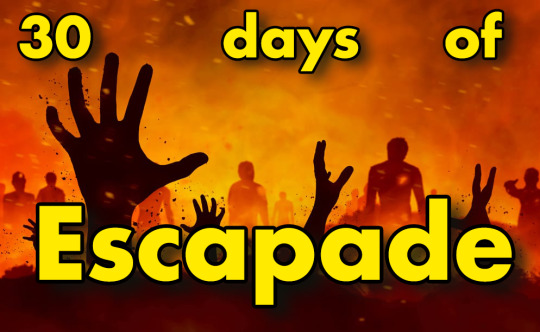
It’s International Fanworks Day and also the 30th and final post in this series. If you follow my tumblr, you know that my true fandom isn’t buddy cops or Highlander or any of those things. No, my true fandom is...
WANK
No matter which bitchy piece of fujo-course nonsense you’re looking at on tumblr, no matter which debate about WNGWJLEO or women in slash or fanfiction vs. media you're reblogging, your grandma was having that fight in a zine somewhere in 1985 and at Escapade in the 90s.
Here’s a vid review from 2002:
"History Repeating," [...] was an Amanda vid. In-fucking-credible. Who knew? Who knew I could like Amanda? Who knew there were fresh HL clips I hadn't seen a thousand times before in HL vids? (Of course, as someone pointed out, she had her own spin-off.) This rocked--sharp, fast cutting and pretty, pretty shots, with a hot bisexy vibe running through it. And, you know, people like to say that there's all this self-hating misogyny in fans--you know, that women hate shows about women, hate women characters breaking up the OTP, etc. But when you see a femme-centric vid like this bring down the house, you really have to wonder. Is it misogyny, really, or is just that we usually see a bunch of crap representations of women in media and resist them?
So on the theme of There Is Nothing New Under The Sun, here is a selection of past Escapade panels on gender, representation, and problematicness:
1993 - Anti-Feminism in Slash Fandom (Or, how 'it was never this good with a woman' syndrome... where are the women, and why do we care?)
1995 - Why Lesbians Read Slash - (What's the attraction? Why do they care? Why do they write it?)
1996 - Character Bisexuality: Convenient fiction or character trait? (Is this a good compromise between "We're not gay, we just love each other" and "I was gay all along and just faking it with women"? Or is this too easy? Special mention for the stereotypical bisexual villian who's evil, sexy, and can come on to everyone.)
1996 - Female Heroes: Female Empowerment, or male power in women's bodies? (Give a woman a gun and make her really tough. Wow, cool! yes, or no? Are we celebrating women, or are we merely putting breasts on male action heroes? Heroines under discussion may include (but not be limited to) Sara Connor, Ripley, Vasquez, Thelma & Louise.)
1997 - Gender Astigmatism (The Gender Continuum: in what we read, in what we write, and what we are, there is always a connection with a point on the gender continuum. How do our definitions of "feminine" and "masculine" influence our creativity? Where do bisexual characters fit in? (besides there, you dirty-minded person!)
1998 - Xena: Does Girl-Slash Get Us Going? (Xena is the first show with a feminine couple to be really popular. What kind of slash fans are interested? Does gender orientation matter? Or do slash fans love slashy couples regardless of their gender? Can m/m fans be 'converted' to f/f fans?)
1998 - Bastards & the Women Who Love Them (When Methos says, "you live to serve me," any normal '90s woman says, "I don't think so!... or does she? A happy contemplation on the virtues of handsome thugs.)
1998 - Slash: a Continuation of Women's Writing, led by Constance Penley (In case you didn't know, in her recent book NASA/TREK (yes, the slash is intentional), she addressed slash as a continuum of women's writing, combining women's romance, and the male quest romance. Join her for a discussion of slash -- where it was, where it is, where it might be going.)
1998 - The Trauma of Slash Fans in Het Fandoms (Or, what to do when find women doing all that cool, tough-guy stuff you love.)
1999 - Male Slash Fans - Welcome Voice, or Infringement? (Slash is written by women for women — or is it? The Internet has attracted new fans, including the "male slash fan". Who is he? What does he think of what "we" do? Do we care?)
2002 - Femslash (General discussion on female/female slash fiction. If Buffy wanted something cold and hard between her legs, why didn't she just choose silicon?)
2003 - Slash: Feminist political act or really good porn?
2005 - Where have all the lesbians gone? (When some slash lists explicitly state m/m only, where do you go for femslash? Are there any hot femslash couples? Pimp your femslash fandom here, or bemoan the lack of strung female characters in the current conservative social climate.)
2007 - Femslash: The Other Love That Dare Not Speak Its Name (Femslash. It's a work that makes some of our hearts leap for joy and inspires complete and total disinterset—or even dislike and disdain—in others. Where can we find the good stuff? What makes it good? And what's up with the haters?)
2007 - SGA: The Women of Atlantis (What do we like about how the women of SGA are written and portrayed, and what makes us wince? What do we think about how their issues are being woven into the show's narrative?)
2008 - Gay is Not Slash (...even though slash is sometimes gay. The current argument about m/m romances by women as taking recognition *away* from male gay writers, depends on m/m writing being intended as gay lit. And slash, for one, isn't, even if there can be overlap. What overlaps? What doesn't? What examples do fans like?
2009 - Female Character Stories: Halfamoon, Full Moon or Just Moony (F/f slash, and other stories centered on female characters, are gaining visibility in fandom. Are there things fens will write about women that we won't about men? (Given MPreg, *are* there?) Should f/f be like m/m, or is it unavoidably different?)
2011 - My ***** is Not Ideologically Driven, But is it Homophobic (Slash fandom often sees itself as a mostly liberal community. IDIC, right? But recently there's been a slash backlash: it's anti-feminist, a 'symptom' of internalized misogyny. We're 'erasing' the women characters after all. Is slash homophobic? Does slash fandom appropriate gay culture? Is it awesome and ennobling as it makes us happy in our panties, or is all that self-hatred bubbling just beneath the surface of our porn?)
2012 - Natural Woman (We've lamented the lack of strong, believable female characters (who dress appropriately). But now we have them: Gemma Teller and Audrey Parker; Salt and Haywire; we've got Bechdel-passing women who look like they can throw a punch. Still, most of them are in the sci-fi or action genre, so are we really seeing progress? And what are we doing with them, as fans?)
2012 - Don't Call It a Bromance (It's Just Canon) (TPTB are increasingly aware of slash, and bromance is regular fare on TV canon these days. Does overt bromance make the fic and art hotter or just vanilla? Is there an anti-slash backlash in our shows? Is the emphasis on men's relationships making women disappear? Inquiring minds want to know. If you have answers, theories, or just want to squee, join in the fun!)
2014 - (The End of?) Ladybashing in Slashfic (Slashfic used to regularly feature bashing of female characters. Now, blatant bashing seems less fashionable. If you recognize this trend, let's talk! Were most ladybashing fics ones for juggernaut pairings in megafandoms, or were they everywhere? What's causing the change: more women in leading roles/ensemble casts, fic writers being more conscious to avoid bashing ladies even if they're not their favorites, more willingness to blame show writers' bad writing (instead of the character being just bad/evil/stupid) for bad female characters, or something else entirely?)
2015 - Fifty Shades of Fandom (Fifty Shades of Grey has become the representation of fan fiction in mainstream culture. It’s bad fan fiction, and it’s being used to ridicule women while making millions off women readers and viewers. Can we connect with these women: proto-fans who would love to read, and maybe write, great fan fiction if they found it? Can we use the FSoG phenomenon to expand our community? Does keeping our doors closed and our mouths shut perpetuate both monetization of our fan culture and misogynist scorn?)
2016 - Who Are We? (How do we define ourselves in this age of so many OT3s and team orgy pairings? Does m/m/f count as "slash"? Is slash-only space slipping away? (And would that be bad?) Do m/m and f/f belong together more than they do with m/f? Is "Media Fandom" a valid term any longer? Who are we if we start shipping het?)
2016 - Ladies Loving Ladies. (There would seem to be enough queer women in fandom to write/want more f/f. Do lesbians write f/f, m/m? Both? Do straight women? Or are we still missing the iconic female characters and relationships that create a great slash fandom? Did they figure out the answer to this question at TGIF/F and if so, what is it?)
2016 - By Us For Us (Fic, even kinky slash, is practically mainstream these days. The ebook revolution puts publishing within reach of almost anyone. Sundance hits have been filmed on iPhones. So why aren't fangirls making more media? Or is it happening right under our noses? Is this a place where our women's gift economy does our community a disservice? Discuss what's out there, what we'd like to see, and what's holding us back.)
2017 - LGBTQIA+ in Slash Fandom (Queer fans have always been here. In a subculture often defined as "for" straight women, what do we as fans have to say about non-straight, non-cis, and non-conventional sexuality and gender in fanfiction, in fandom, and in the larger culture?)
2018 - Confronting the Tensions Between Slash and Queer Representation (Slash fandom thrives on homoerotic subtext. Many queer fans are unwilling to settle for this quasi-representation. Part of every slash fandom seems loudly invested in their ship becoming canon. Some are queer fans who want actual textual representation in their favorite shows, and some are fans using queer politics to fight ship wars. Then the “slash is not activism” posts make the rounds. Is slash activism? Is advocating for slash ships in canon the same thing as advocating for queer representation?)
2018 - Representing Slashers (What does "representation" in the media mean to us? We know what more gay or POC representation means, but what about slash fandom, which is largely female and focused on bodies that don't resemble our own? Would better female characters in media better represent us? Or male characters written for a female audience? Come talk about the intersection of slash, personal identity, and media representation.)
2018 - Anonymity in Slash Fandom: Choosing to Hide (Why do the majority of slash fans hide their hobby? Is it fear of blackmail? Embarrassment? Fear of losing employment? How does this affect your happiness? How does this affect your security? What would an ideal world look like? Who would/have you told about your interest in slash? Who would you never, ever, tell?)
2019 - Fandom Post-Slash? (In an era of "ships" and #pairing #tags on Tumblr and AO3, has the "slash" label lost its meaning? Same-gender pairings are as popular as ever and fans still ID pairings with a virgule between the names, but how many fans still call m/m and f/f slash or femslash? How many fans identify as "slashers?" Het and slash were opposing binaries which few fans crossed. Are these barriers breaking down? What purpose has the term "slash" served? Has fandom moved
past it and, if so, what does that mean?)
29 notes
·
View notes
Text
Video Game Review: GreedFall (Spiders, 2018)
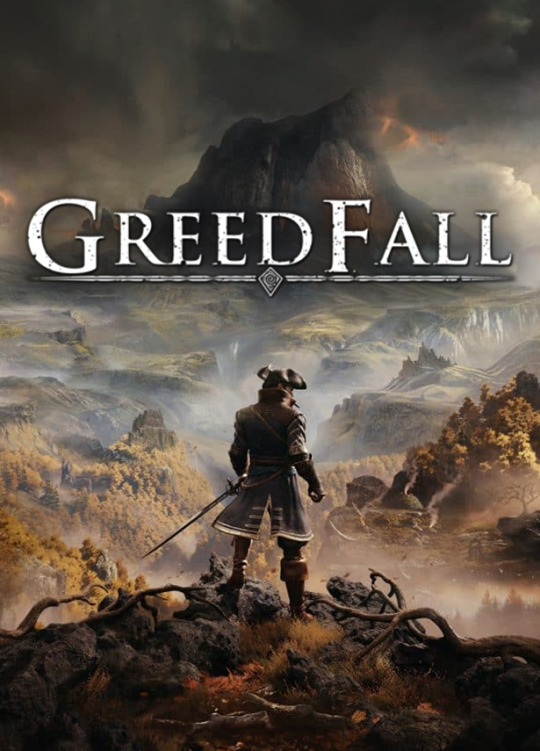
Genres: action RPG, fantasy
Premise: Players assume the role of De Sardet, a human noble who arrives on the recently-discovered island of Teer Fradee. Able to ally with either the natives who inhabit the land and/or any of the foreign nations competing to colonize it, De Sardet seeks out a cure for the mysterious illness that plagues their family, while also battling monsters and magic.
Platform Played On: PC (Windows)
Rating: 3/5 stars
Disclaimer: My rating is in response to multiple aspects of the game, not just its politics. If I were evaluating solely on politics and gave the developers the benefit of the doubt that they were trying to make something with a good message, my rating would be around the 1 to 2-star range, depending on player choices.
***Full review under the cut.***
I am evaluating this game based on four key aspects: story, characters, gameplay, and visuals.
Story: I’m immediately wary of any pop culture item that tries to tell a story about colonialism and Indigeneity because it usually ends up indulging in colonialist fantasies rather than critiquing them. Complex, morally-grey stories are great and all, but when it comes to tales about colonialism, “both sides” narratives tend to look a little insensitive. So, I can’t tell you why I decided to play GreedFall, other than I heard that it filled the Dragon Age-sized hole in people’s hearts. Since I’d rather use my own judgment than read video game reviews, I bought this game on sale and gave it a go. If nothing else, I told myself, I could use my history and literary analysis chops to say something intelligent about it.
In terms of politics, I don’t think GreedFall was as terrible as games where the goal in itself is colonization, but I also don’t think it achieved a narrative that was critical enough of colonization. De Sardet’s primary goal is to achieve balance between all the nations (which I’m calling factions because they’re mostly that). While I can admire that GreedFall really pushed for peaceful relationships, as well as pushed back against abuse and racism, I ultimately thought the developers didn’t consider how the struggle for balance actually facilitates colonialism. This game presents colonialism a diplomatic issue, so as a result, Teer Fradee is kind of a fantasy where colonists can settle on native land while maintaining friendly relationships with Indigenous peoples (at least, if you play it that way - at worst, you can seize absolute power). The experience was similar to the one I had playing BioShock Infinite, whose politics involve a “both sides” argument - the difference is that BioShock Infinite made explicitly clear by the end of the game that Booker was the true villain. With de Sardet, it’s a bit more ambiguous, depending on how you play, but I do think the game pushes you to be diplomatic rather than power-hungry. As a whole, it brings up the very valid question of whether or not colonialism should be in media period, or if there’s some value to be derived from consuming problematic media that tries to do good and talking about it.
Still, I have to give credit where credit is due. GreedFall had the guts to actually try to tackle little-discussed themes in this game, such as forced conversion, abuse within the sciences, and institutionalized bullying. While the missions associated with these big themes were accomplished with varying degrees of success, many of them added emotional depth to the game. Companions would have emotional reactions to these quests that tugged at my heartstrings, and there were never any shots of graphic violence or mutilated bodies, so it didn’t feel like I was playing the game for an edgy thrill. All of the side quests had a lot of bearing on the main plot and the worldbuilding - I don’t think I encountered any “fetch quests,” so most of the things I was doing actually related to enhancing my understanding of the world and its social dynamics.
The game also did a good job of presenting players with factions that were constantly in conflict with one another, lending an added layer of complexity to all the political aspects of the plot. Character’s personal quests were also very well done and had emotional depth. Vasco’s arc about learning about his true family was a nice exploration of birth family vs found family (he’s a sailor whose birth family gave him to the naval faction, the Nauts). Kurt’s quest was also a good one about the bonds between military recruits and really showed his commitment to people over institutions (he’s de Sardet’s commander at arms). Siora’s quests were more about staying true to her culture (she’s a native and daughter of one of a now-deceased tribe leader), while Aphra’s were about learning to be open minded when learning about a different culture (she’s a scientist interested in plants). Petrus’ were a mix of taking down the head of his Church and helping your character find their roots (he’s something of a pastor who also wields magic to fight). You can tell that the developers were inspired by Bioware games in that you can cultivate reputations with your companions and eventually romance them. Many of these romances are available to both male and female PCs, so there’s potential for a queer ship.
I will say that by the end of game, I was emotionally wrecked, despite all the political problems. So, I do think the developers of this game have a good sense of storytelling - I just wish they had done better politically.
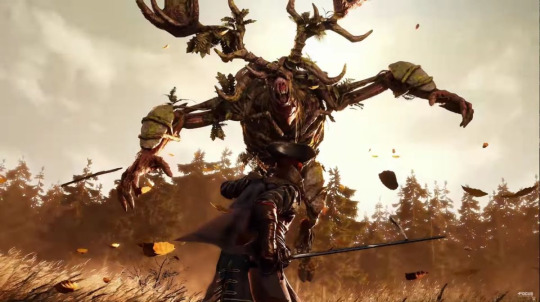
Characters: Similar to Mass Effect or Dragon Age, GreedFall gives players a player-controlled character (PC) and a host of companions to take on an adventuring party. De Sardet, the PC, doesn’t have much personality when they’re being diplomatic, but I did enjoy the moments when they were confronted with information that impacted them emotionally. I played a female de Sardet, and the voice actress did a good job of balancing emotion with the facade that’s required of a diplomat. Constantin, de Sardet’s cousin and governor of New Serene (one of a few colonial settlements on Teer Fradee), is also carefully written as a charismatic, sympathetic nobleman’s son who wants to prove his worth. He and de Sardet share a close bond, which made moral decisions a bit more personal and emotionally difficult. I do think he became a scapegoat for all the evils of colonization, though, and I wish more was done with him to implicate every colonizer on the island. The companions are likewise very likable and fairly unique. Each of them had personal quests and stories that were compelling and sympathetic. I do wish there had been more opportunities to chat with them, or that they talked to each other during exploration (like Bioware companions do). I also appreciated that the Teer Fradee natives weren’t one, homogeneous group. I think too often we see pop culture try to write Indigenous peoples as having the same culture and goals, but with this game, there was some variety regarding what the best course of action would be against an invading force. I’m sure, however, that the depiction of the natives overall was problematic, but I’m not well-versed enough in native representation in pop culture to articulate the issues. While they weren’t portrayed as primitive or child-like (at least, I didn’t think so), I don’t doubt that there were tropes in there that I just couldn’t recognize (for example, Siora maybe a Chief’s Daughter/Indian Princess trope - it’s complicated). I suggest finding and reading an Indigenous critique of the game. (There’s also this one, which is valid, and I do think the game’s efforts and failures are worth talking about.)
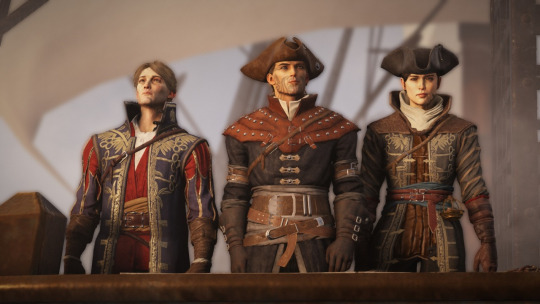
Gameplay: This RPG mainly relies on balancing skills, talents, and attributes. Skills define what weapons you can use and how (one-handed blades, two-handed blades, firearms, magic, etc). Talents are things like charisma, science, or lockpicking - stuff which will affect the way you interact with the world. Attributes are mental and physical abilities like strength or willpower which affect how you wield weapons. Overall, the process of leveling up and gaining points to spend in these areas was pretty straight-forward, and I enjoyed the mental challenge of building a character that fit my play style.
Combat was a little clunky; basic attacks ran just fine for me, but there wasn’t much grace in the way characters dodged or rolled. I also kept getting thrown off by the fact that you can’t press space to jump! But in all, it wasn’t the worst experience. Enemies had helpful health bars, and I enjoyed the combination of a pistol and a rapier to finish off my foes. The diplomatic elements were by far the best part of gameplay for me. If players assign their skill points well, de Sardet can use a number of different tactics and choose from multiple dialogue options, from intimidation to taking advantage of intuition to laying on the charisma. It was fun to figure out which tactic would work on which characters, and how my skill sets translated into consequences for my decisions. I do think, however, that more options could have been presented to players in terms of dialogue choices and role-playing elements. While players make important choices regarding how to handle any given situation, there was little opportunity to purely role play. More opportunities to influence the direction or tone of the dialogue in non-crucial situations, I think, would have helped and made my De Sardet feel more unique.

Visuals: Aesthetically, I very much appreciated that we were given a fantasy game that wasn’t set in the faux Middle Ages. I loved the 18th century vibe to all the clothing and town layouts, and each of the maps were distinct and fully-realized, from the urban settings to the natural ones. There was a bit of repetition in the urban layouts; the palaces, for example, were the same, and some houses were recycled, but it wasn’t nearly as bad as Dragon Age II. I also appreciated that there were people of various races and genders in all positions and all social circles. There were women in the guard, women working on ships, and so on, without any hint that it was unusual. There was also a fairly wide variety of skin tones, with people of color being included in higher social classes and not relegated to lowly servant roles. There are some problems in that “diversity washing” detracts from the racial conflicts that were very present in the 18th century. I don’t think the developers thought through the implications of putting POC in positions of power where they could commit violent colonial acts against the natives. The creatures on the island were interesting to look at. Their designs frequently combined natural imagery (such as vines and wood) with horror to create foes with an eldritch, elemental vibe. The same creepiness was reflected in the fictional disease that afflicts the colonists; the afflicted had black, vine-like tendrils running through the skin, and there was an impending sense of dread whenever I looked at someone who was infected. Despite all the things I liked, GreedFall’s biggest problem is its animation. For a game that was made in 2019, facial expressions and combat are quite clunky, to the point where the characters felt robotic. I understand that not every video game needs to have top-tier level animation, but playing GreedFall was similar to my experiences playing the first Witcher game or the first Mass Effect or Dragon Age: Origins games. Still technically playable, but it feels very outdated.
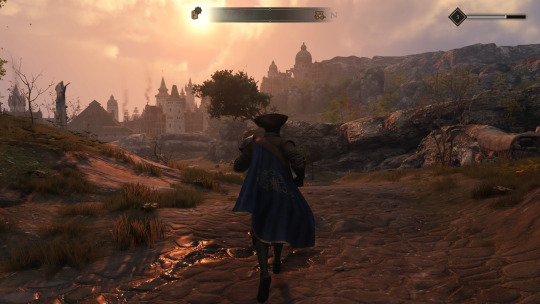
In-Game Triggers: violence (especially racial violence), colonialism, racism, religious zealotry, torture,
I feel the need to point out that while I don’t think this game is gory or explicit in any way (PG-13 would be my rating), there are some scenes that people may find triggering. There’s also one where a Native is killed by a religious zealot, and I found it extremely upsetting (it happens when you first enter San Matheus, if you need a heads up). Other than that, you never actually see characters torture native peoples, but you do hear about it later.
Recommendations: I would recommend this game if you’re interested in the 18th century, the age of imperialism, role-playing games, and fantasy. You might also like this game if you’re a fan of Bioware RPGs.
5 notes
·
View notes
Text
Ey, so, what happened is that I posted a Schitt's Creek fic late last night and went to bed. Then I overslept and went to work and then went straight to some family stuff after work, so by the time I checked up later this afternoon, there were not only comments, but also Discourse in the Comments – enough Discourse in the Comments that I decided that in addition to staying up late tonight to answer individual comments (which is a great problem to have! Fuck sleep, moar comments!), I should probably Address the Discourse in one go so I wouldn't have to repeat myself quite so much.
This is, arguably, a big mistake, since at the end of the day, people feel however they feel about the story, and they're certainly entitled to their feelings. For the most part, my chosen medium for self-expression is fiction, and I figure that if I failed to express myself adequately in the fiction, too bad for me. But what the hell, it's Pride and I like to hear myself talk, so if there is anyone who has questions or weird feelings about the choices I made in this story, I'm making this bit of my Writing Process transparent for you, so you at least know why I did what I did.
The gist, for onlookers, is that there's a moment deep in the middle of this David/Patrick story where Patrick says David is bisexual and David goes along with that, which rang false to some people because elsewhere in canon, David's father describes him as pansexual instead, and we generally assume – and I also assume! – that he does so because that's the label David prefers.
I feel like the easiest first layer of this to peel off is that, yes, Patrick is wrong. Patrick – a deeply closeted small-town boy with few or no close ties to The Community – hears his friend and co-worker talking about relationships with men and women, and he thinks to himself, “Oh, okay, he's bisexual, then,” because to most of the world, that's what bisexual means. I think he would have no reason to second-guess himself on that, or wonder if there's another term that David prefers. Patrick literally doesn't know enough about this issue to know that he might be wrong about it. What Patrick thinks he understands, he doesn't fully understand, and that's intentional, because the whole story is about Patrick being in this “messy middle part,” where he kind of doesn't know the rules and doesn't get things right.
That, I think, came across clearly to most readers, but there was still this question of, well, couldn't I have written David correcting this mistake, at that moment or somewhere else in the story, so that the reader would understand that I know Patrick is wrong and that I, personally, am not condoning the general practice of disregarding people's chosen labels.
And of course I could have. I didn't for two reasons, one of characterization and one of theme – but that's not an objectively correct choice, it's just the choice I made in service of this particular story. A different writer could have gone a different route and written a different story, and maybe that would've worked just as well! But it wouldn't have been a good call for this story.
First, just as a basic point of characterization, it's my take that David Rose actually doesn't feel strongly enough to object. We don't ever see him identify as anything – we see him talking freely about past experiences, but the one and only time he's called on to explain what he is to someone else, it's the scene while shopping with Stevie where (albeit through the lens of what I still feel is a somewhat labored metaphor), he gives a version of Ye Olde “I don't like labels” speech. To me, David is a pretty recognizable type: he thinks of himself as liking lots of stuff and free to do what he likes without being boxed in by other people's opinions, and he's carried forward with the exact same attitude he deployed when he came out to his parents: “I'm doing this, deal with it.” So even though I was aware, and I knew the reader would be aware, that Patrick was wrong, my thought on what seemed natural to David as a character was that I didn't really see him caring about the issue enough to derail what was actually going on in that conversation. That's my read on the character, and it may not match yours; that's fine, it doesn't have to.
However, characters aren't real and don't make decisions; writers do. It would be absurd for me to say, “Well, this is out of my hands, obviously it would happen this way, because Characterization.” I could have structured the whole scene differently, and I didn't. Instead, I wrote a scene where, arguably, a personal of marginalized identity is mis-labeled and doesn't seem to mind that much, and I think one fair response to that scene is to say, Maybe don't volunteer to write scenes that work out that way, when instead you could write in such a way as to demonstrate that you're on the side of not mis-labeling people of marginalized identities.
I did volunteer to write that scene, because I do think this story required that scene. When David says, “It's okay if you are, too” – even though he knows full well that it's not true – what he's actually saying is, “If what you need right now is a label for yourself that's factually wrong, I'm giving you permission to use it.” David is not bisexual and neither is Patrick. This is a scene where David explicitly gives Patrick an exit route if he needs one, where David is actively prioritizing being protective and comforting with Patrick over requiring Patrick to tell the truth. It's an act of generosity on his part, and it's an act of bravery on Patrick's part to refuse it. It's a brief exchange, but it's absolutely central to the moment Patrick is at, where he can't say true things yet but won't say false ones anymore, and the moment completely relies on the reader understanding that this word they're talking about – “bisexual” – is a dishonest word in this context. They're discussing whether or not it's okay to be dishonest, and David's take is “sure, if you need that, then do it” while Patrick's is “that would be going backwards and I'm not letting myself down like that.” David and the reader know that it's a dishonest word in both cases, while Patrick only recognizes that about himself, because again, there's a lot that Patrick doesn't know yet. He's just now learning.
I write a lot of scenes that are “two people in a room talking,” and if done badly, those can be excruciatingly dull. I don't like dull; I like writing things that feel taut and have forward motion and tension, because I think that's what makes a scene memorable. So every time I sit down to write yet another “these two dudes are going to be in a room talking for a while” scene, there are questions I ask myself about what's happening here and why it should happen, because otherwise I'm violating the first and only law of fiction, which is Don't Waste Your Reader's Fucking Time.
The first question is: what's the premise here? What's the situation that confronts these characters, that they're going to be responding or reacting to? And the other question is: how are they going to respond and react to that situation in two productively different ways – ways that are in conflict or incompatible or in competition? If I know what's going on, and I know how these two people are seeing it differently and making different arguments about what should happen next, there's a natural tension of competing agendas that wants to resolve itself at the end, or carry over to the next scene.
In “1001,” my premise is: Patrick is undergoing a process of transformation with regard to his sexual identity that takes time and doesn't really proceed linearly and logically. That's what's happening. The way he's responding to that is, he's frustrated and embarrassed, because he feels like he's failing to master this situation, like it's getting the better of him no matter how he tries to set rules for it. The way David is responding to the premise is, he's trying to curb and mitigate these ways that Patrick is judging himself harshly, trying to get Patrick to accept that the middle is just messy and things will be a mess until they aren't anymore. Patrick is facing a challenge, and they're ultimately in an argument about whether or not Patrick is failing it.
That's why I wanted Patrick to be wrong about certain things – I wanted him to authentically be kind of messy, which shows up in little ways from how he can't get the till counted and he can't say gay and he can't put his finger on the song he's thinking of, and not yet speaking the insider-language fluently is part of that. But more importantly, that's why David's reaction couldn't really involve correcting Patrick's use of the insider-language, because the whole meaning of the story is that David is actively refusing to agree that what's going on with Patrick right now is a problem that needs correcting.
A startling number of writing issues are actually philosophical issues, and this is probably one of them. Like I said, fiction is my main medium for telling people what I think about the world, and the role that I have David playing in this story, as the older, more experienced queer person, is what it is because I have been the older, more experienced queer person trying to figure out how to help someone who's brand new to everything – and what I've come to believe through these experiences is that while there is a time and a place for educators, for being the person who says “actually, that's not quite right, we say or do this instead of that,” the on-the-ground reality is that if people are still in a state of extreme vulnerability and self-doubt, they have a far, far greater need for people who will affirm them rather than instruct them.
Someone in Patrick's place, who is stuck between an old belief and a new self, who feels like they're failing and floundering, who thinks it's easy for other people and hard for them because they're messier or more broken or more cowardly than everyone else, deserves to be received with compassion and told that messy is fine, not knowing is fine, this process is normal and they are fine. The story I wanted to write was about David giving that grace and spaciousness to Patrick, and it ended with Patrick accepting it at least enough to say “this will just take care of itself if I give it enough time” about the song thing, which stands in a bit for his problem-solving approach to the whole situation (because then we know as readers that when he finds the “best song” he's unlocked the whole thing, and we know that's coming, just like David told him the end would come). It's my opinion that having David double back, at any point in the story, and say “actually, that's not quite right, you should have said this instead” would have fatally undermined everything about the alternative argument David is presenting about the nature of Patrick's situation. Patrick is the one who worries about getting this right; David is the one who wants him to be okay with being wrong for now.
And like most writers, when I set up those dueling arguments, I am actually coming down on one side or the other by the end: David's side. I didn't have David correcting him because I think David wouldn't correct him, but even more than that because I think the nature and structure of this story makes it ethically right for David to hold back from correcting him. I think he's the one being the hero here, by accepting Patrick's messiness and imperfection and just taking the approach of, yeah, it's all new, it's tough going, but even though you don't feel fine right now, you are fundamentally fine.
You as a reader don't have to accept that moral argument. You can think it would have made David a better person to model a commitment to truth, to set a higher standard and ask Patrick to live up to it. That's okay! It's totally fine to be like, “I see that this writer wants me to feel one way about this, but actually I just don't, I think that's dead wrong.” Other writers are going to tackle stories about what it feels like to be part of Patrick's coming-out story, both in his role and in David's role, and those writers can and should make their own best arguments, in stories that are built to be about whatever they want to say about coming out. Those stories will just be different from mine, which is great, that's what having a voice as a writer means – that you're thoughtfully constructing stories in ways that express how you see the world, not how anybody else does it.
And if you read “1001” and you cared enough about it to have an opinion, I genuinely appreciate your time and the thought you put into it. Thank you.
75 notes
·
View notes
Text
Feminist Relevant Themes
<-Previous (Introduction)
To talk about Magia Record’s writing in detail, it helps to understand how the game is structured.

Magia Record has many story modes:
Main Story: The main plot, centered on new protagonist Iroha arriving in the city of Kamihama to search for her missing sister. Everyone can read this at any time, and new chapters come out every few months.
Another Story: The events of the Main Story, but told from the point of view of the original Madoka Magica cast. Also always available to everyone.
Magical Girl Stories: short stories centered on one specific magical girl - usually they tell the backstory of the girl’s wish. Can only be watched after obtaining the character in the gacha.
Mirrors Story: A very slowly updated story unlocked by completing many player vs. player battles.
Event Stories: Short stories that come out roughly every two weeks. Sometimes introduce a new character for the gacha, sometimes related to a seasonal holiday. Playable to anyone around during the event (and will be stored in the archive afterwards).
Costume Stories: Tiny story snippets involving a character wearing a special outfit. Implemented one year in and unlocked by obtaining both the character and the outfit in question.
Good
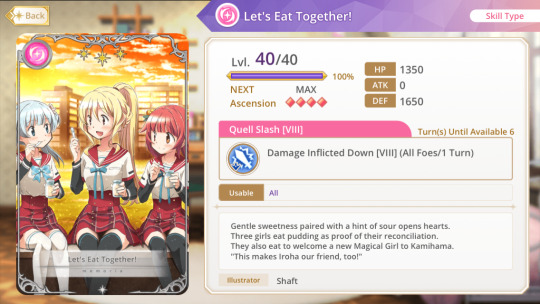
Female Friendship
As with the better side of magical girl media, the game’s biggest feminist plus is its complex female characters and focus on female friendships, including some great examples of female mentors and role models. The mechanics of the setting are even tweaked to facilitate this - gone is the TV series’ lonely, competitive system that isolated girls from each other. Instead, in present-day Kamihama, witches are so strong and plentiful that magical girls are better off forming teams to support one another.
While this change arguably waters down some of the thematic weight of the original (in that this isolation was another example of how Kyuubey’s system is an easy metaphor for other oppressive systems), I find it a worthy trade-off. Allowing for magical girl teams to exist results in much richer possibilities for interactions between characters, especially welcome in a sprawling game with far more narrative content than a one-season anime.
And the game takes good advantage of this - no two magical girl teams are exactly alike, both in terms of internal dynamics and how they interact with other teams.
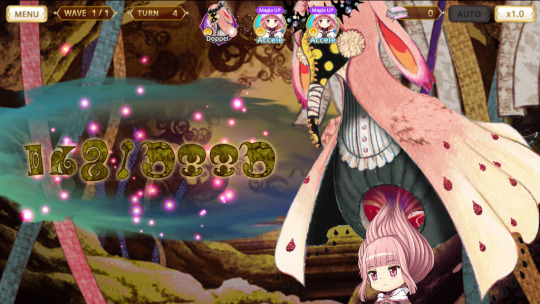
Doppels
The main gimmick of the game’s story is the existence of “doppels” - a mechanic where a magical girl partially transforms into her own witch to unleash a powerful attack. And from gameplay to story to art, doppels are excellent. They look cool and they’re rewarding to unlock and use in game. From a feminist perspective, I also love the idea of reclaiming witches, the “adult” form of magical girls, into a source of salvation and empowerment for girls* instead of a curse. On a meta-level, it echoes a common magical girl trope of the character transforming into an older version of herself, while specifically to Madoka Magica, it’s a creative way to dismantle the misogynistic implications of Kyuubey’s system!
(*There are supposedly drawbacks to doppels, but that bit of setting mostly serves to make them a ~dangerous forbidden technique~ that shouldn’t be overused.)
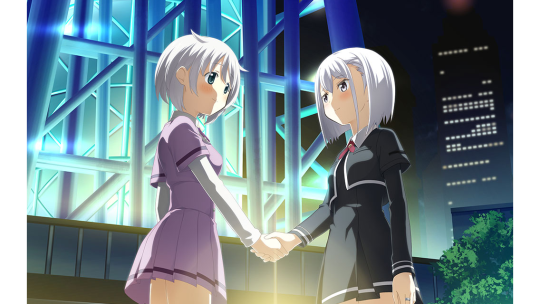
Struggling against class prejudice
The tensions between different wards of Kamihama are a key component of the setting, and affect many character interactions. One aspect the Magical Girl Stories are good at is showing how arbitrary and hurtful this discrimination is, and how difficult it is to overcome prejudice once it has become entrenched. It’s made abundantly clear that Kamihama would be a better city without these attitudes - the question is, how to get there?
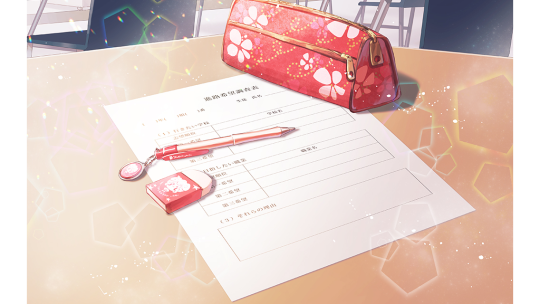
A variety of careers
Several girls make wishes or have backstories centered on what they want to do when they grow up. What’s especially neat is that most girls ask for the opportunity to follow their passions, rather than having a talent magically granted to them - thus avoiding the pitfall of having a female character’s abilities originate from a power granted by a male character.
The range of career interests depicted isn’t as amazing as it could be (In a cast of 80+, I would love to have more than three girls representing STEM), but there’s some decent variety. Many girls aspire to take over their parents’ family business, for example.
And even some characters who follow more seemingly feminine careers (a model, a chef, an artist, etc.) have serious narratives centered on the skill and effort needed to succeed in those highly competitive fields, which is quite refreshing to see.
Mixed
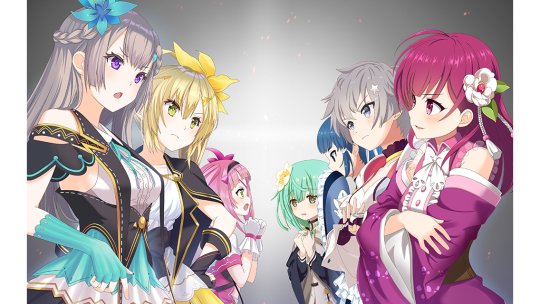
The many different ways to be a girl
The nice thing about having a large cast of female characters is that it gives plenty of opportunities to show how all of these characters are different. And in general, Magia Record does very well on this front! One aspect I’ve particularly been enjoying is the how the cast has widely varying tastes in fiction. Yes, there are girls who like dreamy romances, but there are also girls who bond over their shared love of a hotblooded shounen series!

Where this falls down somewhat is an overuse of “but look, she has a secret feminine interest.” Sometimes this plot can work, if coming at it from the angle that superficial judgments can be misleading, or that there’s nothing wrong with having feminine interests. But when all the more masculine-presenting girls end up with a hidden fondness for stuffed animals, the sheer repetition becomes rather irksome. It’s as though the game feels the need to insist “but look, she really is a girl!” because the audience wouldn’t believe it without such a trait.
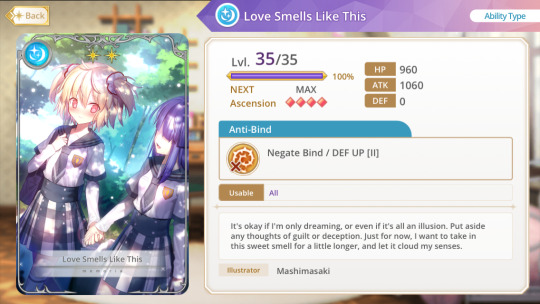
LGBTQ+ characters
In terms of LGBTQ+ content, the game feels rather similar to the original anime and other Madoka spinoffs. That is to say, there are tons of shippable f/f pairings that get teased, but as of the present, only one new playable character (and a tiny sample of minor characters) are explicitly confirmed to be lesbians. No trans or otherwise queer characters either, unfortunately. (Though of course that’s not to stop a good interpretation or headcanon!)
However, as a whole, the game is oddly averse to showing the characters in active, healthy relationships. One of the early frustrations I had with the new character’s portrayal was that the game’s one mutual gay relationship was never directly shown on-screen and gets broken up in favor of more ambiguous teasing. That being said, all the het relationships are treated similarly, either never being confessed and requited or never getting shown on screen. So… I suppose there’s not actually a double standard here, but players hoping for lots of canon yuri content might end up a bit disappointed.

Also, a note on Homura specifically - this game’s version is “glasses Homura,” who hasn’t realized she’s in love with Madoka yet. So despite what you might expect given Rebellion, in Magia Record there’s nothing beyond heavy hints and ambiguously cute scenes between her and Madoka.

Characters with disabilities
A few characters in the game have difficulty speaking. It’s not made clear if this is a speech impediment or something like social anxiety (or autism - I know I’ve seen headcanons for that). There is some depiction of these characters getting bullied, but in each case the character ultimately finds a group of friends who love and support them as they are.
After two years, now there is technically a magical girl who uses a wheelchair. (And it’s a cool custom wheelchair too!) Unfortunately I hesitate to count this as a full positive, because shortly after she appears in it, the character becomes unable to transform and fight for an unrelated reason, so we haven’t seen her in battle since. But who knows - the story’s still moving forward on the Japanese server, and there’s likely to be more content with her in the future.
At the end of the day, though, this is a setting with magic wishes and healing effects. Thus, it’s very common for girls to wish to cure someone’s illness, or to use their abilities as a magical girl to cure themselves, which can easily fall into ableist tropes.

College age magical girls
Yes, really! Although even the oldest characters are only nineteen. However, there’s also a subplot about how two of the nineteen-year-olds are losing power because they’re older, which… hm. The message that we all need to accept passing the torch to the next generation is generally a valuable and good one. Aiming it at older teen girls just on the verge of adulthood is where the implications nosedive into unfortunate. Young girls already get far too many messages that their worth is entirely dependent on their youth/beauty/innocence and that it’s better to stay a “girl” than to be a fully grown “woman.”
The entire reason it’s exciting to see college age magical girls in the first place is that even now, it’s rare to see adult women as protagonists in these types of fantasy adventures. By introducing these young adult characters only to caveat their inclusion with“they’re getting too old to be here”, it puts a very sour note on what’s otherwise a welcome expansion of the Madoka Magica universe.
(It’s also hilariously contradictory to other spin offs in the Madoka Magica franchise, including the implications of the anime canon itself, so… whoops?)
Bad

Lack of diversity
(Particularly racial diversity.)
The only non-Japanese magical girls are from the pre-existing Tart Magica spin-off set in medieval France… and Meiyui. (And maybe Alina.)
Meiyui is a complicated case - her family has ties to both Japan and Hong Kong. Meiyui herself is a fun character, but she also ticks a lot of the checkboxes for a Japanese stereotype of a Chinese person (a la Xiao Mei in Fullmetal Alchemist). As a white person only familiar with US culture, it’s not my place to make a judgement call here, but I’d love to hear from someone who knows more!
The largest disappointment, though, is in wondering what might have been. The Madoka Magica anime implied that there are magical girls all over the globe from every different time and culture, so the game’s narrow focus on one modern Japanese city greatly limits the setting from its full potential. And even within that limitation, the sheer homogeneity of the new cast is starting to get awkwardly same-y.
The arc two’s logo teases what might be girls from several other backgrounds, though, so perhaps this will improve in the very near future. Of course, success will depend on the writers’ abilities to handle other cultures. Which, when given the example of Meiyui, might actually be cause for concern...

Revolutionary Girl Utena, this ain’t
In a game full of decent-to-good backstories, you’ll sometimes hit an unfortunate and very disappointing outlier.
My personal least favorite is the victim-blaming one mentioned in the content warnings. Another low point is a story where a girl frantically diets as a response to another girl’s comments about her weight.
Then there’s the backstory the above picture comes from. It involves a girl who has to drop out of sports because her next school only has a boy’s team - and instead of challenging this situation, it’s the inspiration for her to discover she’s actually happier as a cheerleader anyway. Hm.
This last case is actually pretty emblematic of the game as a whole. Whoever’s doing the writing (the credited scenario team is four people, and from the names at least two might be women?) mostly seems to mean well, but they occasionally step hard into the -isms that come from not actually thinking about the problems with the status quo.
So the game isn’t typically hateful, but it doesn’t push the envelope in any revolutionary directions either. As a result - and it feels weird to say this, but - I really miss having Urobuchi as the writer. Sure, his writing had its own problems, but in comparison, it was at least genuinely thought-provoking. The way that even the adult female characters got complexity and screentime, that whole conversation between Sayaka and the misogynistic men on the train, the compelling exploration of consent and determination that underlies the whole anime – even six years later, these aspects hold up and stand out.
Magia Record is an inversion – far more pleasant on the surface, but without the backbone and depth that made the original so thematically intriguing despite all the suffering.
Next (Other Writing Aspects)->
#puella magi madoka magica#pmmm#magia record#magical girls#feminist analysis#my blog organization tags#magia record analysis#my feminist friendly magireco review#madoka magica#magical girl genre#magia record jp#magia record na#my ramblings#haha this section is so long#nothing else even touches it#and even then there’s so much other stuff I could rant about lol
16 notes
·
View notes
Text
Ace representation gives me weird feelings.
This was originally posted on pillowfort, and is being reposted here for the September 2019 Carnival of Aces.
To be 100% clear: I AM ACE. (And aro, and the concept of gender gives me approximately the same feelings as the concept of being covered in live spiders, which I will grudgingly/squeamishly refer to as being agender or nonbinary when a label is required.) Relevantly: ace.*
I began to identify as ace when I first heard the word, and had an "oh" moment. (Or rather, multiple simultaneous "oh" moments. "Oh that's a thing" and "oh maybe my classmates aren't all just faking relationships to mimic TV" are the two I remember most clearly.) It was July, and at the time I was fifteen; I'm currently 28, so that's a bit over 13 years. I'll skip the full journey, but the point is, this is an identity that I've had for a while and am comfortable with.
Despite that, ace characters in fiction give me weird feelings. I mostly end up metaphorically staring at fiction which I know contains ace characters, going "hrmmmm I can't parse exactly what feeling I'm having, but I'm not enjoying it," to the point where I sometimes end up avoiding them entirely. I doubt I'll be able to analyze all of why, but I'd like to at least try to start.
I'm also not referring to bad representation, or even to representation that focuses heavily on angst/suffering/prejudice. Several years ago I read a large chunk of Shades of A (which, for anyone unfamiliar and about to click that link, includes a lot of kink and general adult themes; since it's been years I can't recall exactly what's in it) which was, from what I recall, very well done, and then I hit a point where I just... couldn't make myself keep going. More recently I've heard several times about Every Heart a Doorway and thought 'that appeals to literally everything I want in fiction that I can think of' and then... not read it.
On the other hand, if a character is called asexual or characterized in a way that I can easily interpret as their being asexual, but it's not a major focus of the story or descriptions/advertisements/reviews thereof, I don't have the same reaction. So for the rest of this post I'm just going to be discussing the former category (fiction with asexual representation that does give me weird feelings), and not addressing works that have an asexual or easily-read-as-asexual characters without giving me the weird feelings about it. (The only real explanation I have for why a work falls in one category or another is the 'is it a major focus' question, so I don't think I can get anything useful out comparing them.)
Some of this, I'm sure, is that I'm just generally low on energy; I'm not reading much of anything that isn't fanfic right now. But I tend to avoid fanfic tagged or described as having an asexual character too, so it's not just that.
The most obvious source is just that ace characters are unfamiliar. There are a handful around now, even in mainstream media, but that wasn't true until I was in my 20s. (Unless, of course, you counted the monsters/aliens/serial killers, and even then it was only the monsters/aliens/serial killers that the creator wanted to emphasize were really, really inhuman, even more than your typical monster/alien/serial killer. And I was never fond of horror anyway.) So ace characters stand out to me in a way that straight characters (and gay or lesbian ones, thanks largely to the Valdemar series) don't. That extra attention-catching element can in itself make the representation feel weird and off on a level that's often subconscious and therefore difficult to dissect. Again, though, while I think this is likely to be an element, I don't think it's the only reason.
I think some of it is the expectation—mine, but absorbed from a more general one—that if an asexual character is present, that should be the character that I most strongly (or even exclusively) identify with and connect to. But that's often difficult: Anwar from Shades of A, for example, I have prettymuch nothing in common with except for being ace, our general age range, and maaaybe some of the social awkwardness and tendency toward geekiness that 98.5% of characters on the internet have. I spent a lot of the time I was trying to read the comic being frustrated at every significant decision Anwar made because, while I probably would not have made better decisions, I certainly would have made different ones, and couldn't bring myself to empathize with his reasoning or priorities in any but one minor aspect.
And again, it's not that he's a bad character, it's just that he and I have nothing in common. But I felt like I ought to empathize with him—I'm pretty sure he was the first ace character I ever encountered, so obviously I should empathize with him strongly and immediately and easily, right? Not even "I should be able to," just I should, like saying the sun should rise in the morning, it's expected to just happen. And because of that I couldn't pick another character to identify with (JD is nonbinary! Chris and I have the same hair color! From what I remember they both have a more similar personality to me than Anwar does!) and I also couldn't just let myself gradually develop an understanding of Anwar's thought processes and start empathizing with him over time, because I was supposed to identify with him yesterday. (Or rather, at least five years ago.)
(To be clear: none of this is something I was thinking consciously at the time, I was just frustrated with Anwar's decisions and didn't really analyze it further until like, two hours ago. But from my current perspective, I think this is what was going on.)
Since I haven't actually read Every Heart a Doorway I of course can't be sure the same thing would happen, but I think I've avoided it because I expect it to. From the summary it sounds like the main character is maybe fifteen or so, and the majority if not all major characters are mid-to-late teens? So I'd be reading the book more as an observer than projecting myself among them, which is fine and often a thing I enjoy in fiction (because I'm way too empathetic and that distance helps tone down my distress at every little thing ever). But with an asexual main character... well, I wouldn't quite feel guilty about not identifying with her, but I'd be conscious of it the entire time I was reading in a way that would be distracting, and wouldn't be enjoyable.
Another possible element is that I tend to avoid fiction (and fanfic) in which a romantic relationship is the primary plot. Since the majority of all fiction is romance, logically the majority of fiction with ace characters will be as well, and 'has an ace character' isn't enough to make me interested. I think there's also a chance that romance fiction is in fact more likely to have an ace character, and/or to be labeled as having one (particularly in the case of fandom/fanfic/original work in fandom-derived areas). A creator whose primary story focus is the characters' romantic and sexual relationships is more likely to consider the characters' romantic and sexual orientations, and therefore more likely to explicitly call a character asexual (whether in the story itself, a summary/description, or tags). Trying to read a story with an asexual character but being bored because it's a romance gives me about the same not-quite-guilty-but-not-comfortable feeling as being unable to identify with an asexual character does.
When I was in college I explained Asexuality 101 to various people or groups of people at various times, and one of the things I found myself explaining a lot is that "asexual" is actually just as much an umbrella term as "queer" or "trans" is. Even without including demisexuality and the gray-a spectrum in the term (which at the time as far as I knew, at least, the most common approach was to just say "asexuality and gray-asexuality" if you wanted to discuss both) "asexual" includes asexuals of every romantic orientation and aroaces and people who prefer not to use the construct of romantic orientation, asexuals who are repulsed and who enjoy sex and who don't care too much either way, asexuals who lack attraction or libido or both or who experience both but are asexual anyway, because humans are complicated and sexuality is complicated and human sexuality is, therefore, utterly bizarre, and it would be weirder if asexuality (or any sexuality) were easy to define.**
And I think that's a factor too; there are asexual people whose experience of What It's Like To Be Asexual will have not one single thing in common with my experience of being asexual, and so a character that perfectly represents them will just leave me confused. Which gets back to the thing about asexuality not really being sufficient for me to identify with a character, and the way that that fact runs into my expectation that it should be sufficient. Like walking down a sidewalk, pausing to do something, then looking up and discovering a wall half an inch from my nose. It's not painful, but it's jarring and annoying and I kind of want to look around and check if anyone saw that, because if so I'll be embarrassed about it.
(And I expect that most likely there are other factors, but I'm not coming up with them right now and this is long enough already, so I'll wind down here.)
I don't think this is a problem, or something that needs to be fixed; if "I'm not consuming the fiction that I would have expected myself to consume" is a problem at all, it's definitely the most minor one I've ever experienced. If it does need to be fixed (or prevented), I think that "have more ace representation so it's not a Rare New Extraordinary Thing all the time" is probably the solution, and I'm pretty sure that aces are already in favor of more well done ace representation in fiction.
But it's still an experience, and it's been gnawing at my brain for months, so I'm posting this and... well, we'll see if and what use people make of it. Has anyone else had the same or a similar experience? Any thoughts on other factors which I didn't think of? Some other related thing I missed?
*I'm not discussing aromantic or agender or nonbinary representation/my reactions to it because 1: asexuality is by far my "primary" identity (in the sense that it's significant to how I define and think of myself, while being aromantic and agender are just sort of... facts that forms sometimes request; probably largely because I settled on both those identities much later), and 2: frankly I haven't encountered aromantic or agender representation enough or in the right ways to experience this dynamic with them. Or any dynamic, really.
**If you want to argue with me about the definition of What Is Really Truly Actually Asexual and how something I included Doesn't Count, please make a separate post and like, send me a link or something if you really want my opinion specifically. My opinion is pretty firm but I'm willing to discuss it in good faith, but it's not the point of this post and I'd rather not go off on that tangent here. Same if you want to argue that gray-asexuality ought to by default be included with the term 'asexual;' I don't honestly care either way on that one, I'm just describing the vocabulary I was familiar with at the time.
#asexuality#asexual#asexual representation#ace#Carnival of Aces September 2019#repost from pillowfort
5 notes
·
View notes
Text
Fun read. His case is strong, very strong!
I'm down for a Man from UNCLE sequel!

Jan 7 2019
I’m not sure how everyone missed this when it came out in 2015 but the queer energy that this movie puts out is intoxicating.
Guy Ritchie’s 2015 retro spy flick The Man from U.N.C.L.E. is a fantastic and fundamentally bisexual movie, and I will die on this hill.
As a bisexual cinephile, I find myself queering most films I watch. Unless and until I’m told otherwise, all movie characters are bi. Still, some movies stand apart. Not because they explicitly embrace queerness, but because they feel queer on some deeper level. They exhibit queer themes, queer aesthetics, queer politics. They lend themselves to queering by the audience (...)
The Man from U.N.C.L.E. is one such queerable film. A remake of the 1964 series of the same name (which itself didn’t exactly scream "straight"), the film exudes bisexual energy at every turn, both narratively and in the chemistry, between not only its three protagonists but virtually everyone they come into contact with.
To be abundantly clear, I know the characters weren’t written bi. I know there’s nothing explicit in the film. (...)
U.N.C.L.E. opens in 1963. Suave CIA agent Napoleon Solo (a dapper Henry Cavill effortlessly channeling James Bond) is on an extraction mission in East Berlin. He’s looking for fast-talking car mechanic Gaby Teller (Alicia Vikander), whose former Nazi scientist father may be helping a group of international terrorists build a nuclear weapon. Hot on their tail is no-nonsense KGB agent Ilya Kuryakin, played by tall, broody, square-jawed Armie Hammer. Soon the two spies are tasked with working together to find and stop Teller, with Gaby along for the ride and more or less on their side.
The plot doesn’t really matter though. The pleasures of The Man from U.N.C.L.E.—and there are many—come down to the quick repartee, charming flirtation, gorgeous mise-en-scène, and constant turning of tables, where any back can be stabbed by anyone at any time.
The actors deserve a lot of credit for how bisexual this whole endeavor is. The three protagonists bicker to no end, and while Ilya and Gaby’s playful fighting (sometimes literal wrestling) does explicitly lead to and connote romance, Ilya and Solo exhibit an almost identical tension (wrestling included) that seems hardly limited to the bromance the filmmakers might have intended. Solo and Ilya are jealous of each other’s love interests when they’re not comparing gear and bugging each other’s rooms (the double entendres are hard to keep up with). Add in the overt flirtation between Solo and Gaby when they have their own meet cute, and you have a rather perfect love triangle between the three.
The villains get in on the action too, each as universally flirtatious as the next. (....)
In hindsight, casting doesn’t hurt either. U.N.C.L.E. stars queer ally Armie Hammer. Hammer played down his onscreen kiss with Leonardo DiCaprio in 2011‘s J. Edgar as a normal part of acting, and was visibly and physically affectionate with his co-star Tomothée Chalamet during promotion of their queer coming of age hit Call Me By Your Name in 2017. Accusations of self-satisfied queer-baiting are not unreasonable, but for what it’s worth, Hammer’s enthusiastic allyship has always come off as entirely sincere to me.
Beyond Hammer, the entire cast is just absurdly good looking to the point of distraction. It’s not just that any pairing could work, it’s that they all seem so darn appealing—I can only assume the film itself left more than a few impressionable viewers with questions about their own chaotic scattershot of attractions.
I’m not alone in my thinking. I’ve found ample common ground when bringing this film up with bisexual friends. The world of fan fiction, well known for queering pop culture, has also embraced U.N.C.L.E. As I write this, popular fan fic database Archive of Our Own lists 2,702 works of Man from U.N.C.L.E. fic. For comparison’s sake, 2013’s Man of Steel has just 543 entries, and the whole Die Hard franchise has 623.
Even a handful of film critics could see, if not the full bisexual potential of U.N.C.L.E., at least some hints of homoeroticism. None really followed the queer breadcrumbs all the way to any satisfying conclusions though.
In one particularly dismissive review from Wired, Daniel Smith suggests that any homoeroticism applied after the fact should be disregarded. The question “are they gay?” Is irrelevant. Instead, men—straight men, presumably—should be inspired to emulate the warm camaraderie of Solo and Ilya as some kind of model for healthier masculinity, says Smith.
Please!
What a cop out, and what a heteronormative view of male bonding. Healthier masculinity is a noble pursuit, no doubt, but why should it come at the expense of attraction between men? Non-straight men aren’t magically exempt from toxic masculinity, and our experiences shouldn’t be passed over in the name of educating straight dudes.
But there’s more to it than that. The dismissal of the hints of attraction between Solo and Ilya (who also both display attraction to many women) leads critics to pass over U.N.C.L.E.’s fundamentally bisexual—rather than gay—themes.
The whole premise is one big Kinseyian metaphor. Alfred Kinsey famously established the concept of the Kinsey scale, whereby human sexuality exists on a spectrum. Your sexual orientation can be measured from zero (exclusively heterosexual) to six (exclusively homosexual). It’s a relatively blunt instrument for measuring sexual attraction, but it gets at the basic notion that sexual attraction exists on a spectrum rather than being binary
Our two Greek God-inspired super spies similarly find themselves somewhere between two polar extremes when they decide to collaborate for the greater good (the expression “playing for both teams” comes to mind).
The basic Cold War tension between East and West is extremely binary in nature. The film’s opening credits graphically illustrate this by drawing straight, hard lines on animated maps between East Berlin and West Berlin. But the entire narrative undoes this division by bringing the CIA and KGB together in a murky space somewhere in between American and Soviet politics.
In one early scene, we see Solo zip lining across the border between East Berlin and West Berlin. When Ilya attempts to follow, Solo lowers the wire, and the Soviet spy is caught right in the middle of the two extremities. It’s a beautiful bit of imagery that sums up my entire argument. This is a film so conspicuously invested in exploring the middle ground of things that it thematically lays the groundwork for queering its characters.
One can only hope that a more overtly queer sequel might one day grace our theater screens. Or a moreexplicitly queer sequel. Solo and Ilya are paired up by their superiors as they tussle in a men’s room, for God’s sake. The messaging is clear, just not stated in so many words.
Rumors of a sequel have circulated for years, but unfortunately U.N.C.L.E. wasn’t a huge hit at the box office, despite how incredibly fun the damn thing is. One potential explanation for its failure is that 2015 was a pretty crowded year for 60s spy nostalgia, and it had to compete with the latest entries in the more well-established Mission: Impossible and James Bondfranchises.
Nevertheless, Hammer has pointed to the film as one of the roles he’s most often asked about by fans, and he once even suggested he’d talked screenwriter Lionel Wigram into starting on a sequel. I’m still skeptical, as nothing definitive has been announced yet.
For now, I’ll hold on to what we have and cherish The Man from U.N.C.L.E. as a resounding bisexual anthem. Anyone who refuses see it as such is frankly missing out on some of the film’s most rewarding features.
In short, it’s ours and we’re keeping it.
#armie hammer#cmbyn#call me by your name#on the basis of sex#onthebasisofsex#felicity jones#the man from uncle#man from uncle#tmfu#guy ritchie#henry cavill#alicia vikander#elizabeth debicki#solo#ilya kuryakin#queer#queer eye#queer film#queer fiction#biseuxal#012019
7 notes
·
View notes